ASK THE AI TUTOR IS HERE!

In an accountancy first, Open Tuition has added an ‘Ask the AI Tutor’ service function to its website.


For each ACCA paper students will now be able to type in questions and receive an instant computerised answer.


The Open Tuition AI is more accurate (and faster) than freely available ChatGPT, because it is using the knowledge database that accountancy tutors have created, as opposed to simply trawling the internet for anything it might think relevant.

Open Tuition founder John Moffat told PQ magazine that it may expand the service to CIMA students, depending on the response from students. However, he felt there is no reason why CIMA students should not use the ACCA service, given much of the knowledge needed is the same.
He explained: “The results have been astonishing. For written questions it is coming up with almost 100% accurate answers in easy to understand English. When asked to tackle objective test
Continued on page 4
NEWS FLASH: AAT Q2022 ASSESSMENT UPDATE



AAT is systematically working through the problems with its Q2022 assessment software, with some progress being made. But there is still more to put right.
In an exclusive interview with PQ magazine, AAT CEO Sarah Beale (pictured) said that she believes the issues with the mouse curser ‘jumping’ have been largely resolved, with “a few exceptions”.

The AAT has seen encouraging signs in recent weeks, and there are early indications that the problems with loading and submitting assessments is improving. Beale explained most assessments were being submitted successful, but that the system wasn’t showing that at the sitter’s end. Obviously, it’s distressing for students to leave their assessment
unclear about whether they have submitted.

The biggest issue to put right is with the Management Accounting Techniques (MATS) assessment at
Level 3. Beale admitted there is no immediate fix here.
She revealed that after making improvements AAT had rigorously tested and ran lots of assessments,


only for some of the glitches to reappear. Beale said there is no magic wand to fix these problems, as the assessments are complex and continually available. However, the number of incidents is falling.
She has also appointed a new technology director, Michael Perillo. He and his team have been liaising closely with colleges to see the problems first-hand.
Beale thanked both students and the training providers for their patience, and stressed that she understood that the current level of service “was not good enough”.
Meanwhile, Q2022 has been heavily praised by tutors for providing students with the perfect launch-pad into a modern-day accountancy career. See our feature on page 25

Incorporating NQ magazine July 2023
jobs.co.uk SPECIALANAAT ISSUE



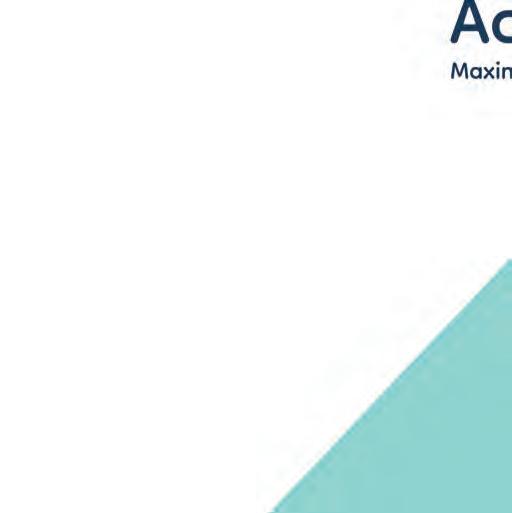



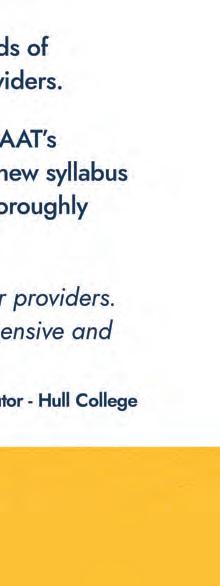

IN THIS ISSUE
A note from the Editor
Does AI dream of sitting accountancy exams? I very much doubt that! But AI has arrived to help you, in the form of Open Tuition’s ‘Ask ACCA AI Tutor’. Despite being a free service Open Tuition continues to be ahead of the curve, and that’s perhaps why they won one of my Editor’s awards this year.
Founder John Moffat told me the AI is already pretty good at passing the exams too, which begs the questions – if the AI is good with the numbers then should accountants beware? Many people still tell me they went into accountancy because they like working with figures. The problem now is there is something that is even better than them. You will have to bring more to the party.
PQ magazine is unique when it comes to our news coverage. Following the first extreme weather warning ICAEW PQs are asking why they have to sit exams in July (again); we look at ACCA’s exam fee rises; and finally get our hands on CIMA’s pass rates.
This is an AAT special issue, with analysis of those Q2022 pass rates and the new route to membership. And, to top it off, Accountext are offering one lucky self-study student the chance to win AAT textbooks. To enter the prize draw check out page 28. Happy reading.
 Graham Hambly, Editor and Publisher, PQ magazine
Graham Hambly, Editor and Publisher, PQ magazine

Features, etc
14 Have your say AAT needs to raise its game over our tech problems; how the AAT’s new pathway works; and in praise of Paul Merison. Plus our social media round-up
17 Stealth tax rises More and more people are being dragged into the higher rate band for income tax
19 ACCA SBL exam ACCA is adding pre-seen material to this exam – so how will it work?
21 CIMA spotlight How to pass your case study exam
22 A question for Tom
Tom Clendon explains the upcoming changes to the Strategic Business Reporting paper
23 VAT updat e VAT on land and buildings made simple
29 AAT pathway Association is removing barriers to membership, while continuing to offer support for students
31 Back to basi cs
Karen Groves explains the accounting equation, also known as the dual principle
32 AAT spotlight
It’s quiz time – for AAT Level 2 and Level 3 students
News
4 ACCA exam feedba ck
The good, the bad and the ugly: our round-up of the latest set of exams
5 Bespoke MSc for Deloitte Big 4 firm teams up with Edinburgh Napier for new initiative
6 AAT adjusts exam marks AUDT and INAC sitters get grades revised upwards
8 ACCA exam fees risin g Association hikes entrance fees by 5%–7.5%
9 ICAEW keeps July exam Students fear another long hot summer of exams
10 Sustainability IFAC issues new guidance on greenhouse gas reporting
12 Tech news Councils reprimanded for failing to respond to data requests

24 IFA spotlight Why the training never stops: it’s vital you look to the future
25 AAT Q2022 results Latest set of figures show fewer borderline passes
26 Study advice How to make the most of your study time in the run-up to an exam
28 AAT study materials Meet Accountext, provider of great resources to help AAT studiers get qualified
p22
34 ACCA exam feedba ck
What you thought of the June exam diet
36 Profile
How accountancy can open the doors to academia

37 Careers
What Gen Z really wants in the workplace; tackling your career worries; and our Book Club review
38 Fun
The lighter side of life – and accountancy
The columnists
Lisa Nelson Why having someone watching you will help you study 4
Robert Bruce Accountancy is about the words, not the numbers 6
Prem Sikka Profiteering by corporate giants is our real problem 8
Ann a Kat e Phelan AI adds to fears over our privacy 10
David Rothera Are media reports harming accountants’ net zero efforts?
12
To subscribe for FREE go to www.pqmagazine.com July 2023
p17
contents p31
Another CFO forced to resign James Turner, the CFO of Prudential plc, is leaving the company in light of an investigation into a code of conduct issue relating to a recent recruitment situation. In a statement to the Stock Exchange Prudential said the group sets itself high standards and Turner had fallen short on this occasion. Despite the resignation Turner will stay on for four months to smooth the transition to the newly appointed CFO, Ben Bulmer.
The crying game
Have your accountancy exams made you cry recently? Well, quite a few sitting the ACCA June SBR exam admitted it did all get a bit much for them!

One student revealed they called their mum after the exam and started crying. Although, they did add they can be quite dramatic! However, they were not alone, another PQ said: “It was horrific, first time I’ve come out of an exam and cried. I’ve passed all my others first time but setting myself
up to resit this one.” They were gutted because of the long hours of revision they had put in. They explained: “The knowledge was
We had a great turnout for the third in our series of Queen Mary University of London seminars. The title of the evening's event was ‘The Future is Net Zero, can accountants help to save the planet?’ Among the speakers was Gokcen Censur, ESG Assurance Manager at PwC UK, who is pictured giving her presentation. We will have a full report on the evening in the next issue of PQ magazine, along with a link to the video of the event. Everyone agreed it's going to get tricky when companies must account for their Scope 3 emissions. One of the Big 4 firms was called out for not doing enough when it came to their reporting. Offsetting and greenwashing were also heavily debated.
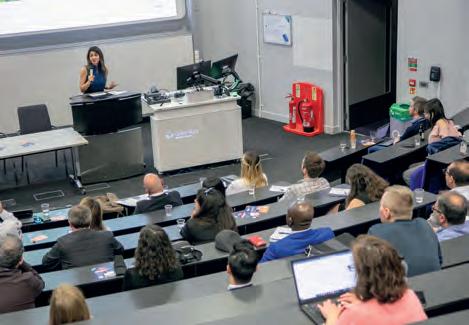
Ask the AI tutor is here!
Continued from page 1
questions, again it is remarkable how accurate the
– and
Moffat admitted that for advanced calculation questions
He said that when AI tackled some full 50-mark past AFM questions the answers to the written section were remarkable good. Its answers to the calculation parts, which commonly require reading a full page of information and then using various different formulae
Turner’s demise follows that of fellow CFO David Egan, who resigned recently from FTSE 100 company RS Group, after a personal relationship with a colleague.
What’s happening with the ethics module?
ACCA’s ethics and professionalism modules (FIP/EPSM/RPEM)
continued to remain temporarily ‘out of service’ as PQ went to press.
Work to move these modules onto a new hosting platform is
have been impressive too. While the AI has not always arrived at the correct final answer, it was able to explain each of the workings as it performed them and the resulting answer would without doubt have achieved high marks in the exam, Moffat said.
He stressed students should not see this new resource as a quick and easy way of passing exams. Students still need to study as they do now. “The purpose of the AI is to give them instant 24/7 help on issues that they have problems understanding,” he said.
Inevitably, there will be students
progressing well, says ACCA, and it believes they will be available again ‘in near future’.
ACCA said it appreciated students’ continued patience while it carries out this work and once again wished to apologise for any disruption this may have had on their ACCA journey.
It will provide a further service update before the end of June. Should students need any further information in the meantime they can view: FAQs on ethics module service issues | ACCA Global.
there, but that exam was just cruel.”
Yet another sitter revealed: “What on earth was that! That was a horrific exam, I nearly cried half way through and had to take a threeminute break as my mind froze and I went blank.”
Hardly surprising then that in the Open Tuition Instant Poll taken immediately after the SBR exam, some 42% of sitters felt the June test was ‘hard’, and for another 35% it was a ‘disaster’.
For all the feedback turn to page 34. Where you can also discover what the first things students do post-exam. You may be surprised!
simply typing in test questions to get answers, although Moffat believes this is not a great approach to success. “They should still be using revision kits and remember the AI can’t be used in their exams, they have to do the work then!”
He emphasised that Open Tuition’s AI cannot guarantee 100% accuracy, and pointed out that it will not replace Open Tuition’s existing Ask the Tutor forums, where students get personal replies to their questions from tutors.
This latest move will surely put pressure on all the accountancy bodies to add AI features to their own platforms.
Check out the Ask the AI Tutor at https://tinyurl.com/38f5fa8u

Revision to Corporate Governance Code
The FRC has launched a public consultation on proposed revisions to the UK Corporate Governance Code. This follows the UK Government’s response to the White Paper, Restoring Trust in Audit and Corporate Governance, which identified areas of reform related to a particular focus on directors’ responsibilities for internal control, risk, audit and corporate reporting. This limited revision of the Code is the first for five years.
PQ the PQ Magazine July 2023 4
In brief It's easy to think that when you give information to people they will act upon it as long as it’s in their best interest – but that’s often not the case. Take health, for example: over half of the UK population is classed as overweight, and yet even though the evidence exists to show that being overweight is detrimental to your health, that statistic shows no signs of falling. One of the most effective ways to lose weight is to join a group of like-minded individuals and be formally weighed each week. Although there are other factors at play that could impact someone’s commitment to following the advice, one of them is that it creates a sense of accountability resulting from being supervised. In 2023, a group of researchers wanted to get students to do more question practice. The reason was because there is strong evidence to show that retrieval practice, as it is called, is a very effective study technique. In the experiment two groups of students were told about the benefits of question practice. One group was left to study on their own while the other remained in the room under supervision. Those who were not supervised ignored the advice and didn’t change their behaviour, while those being watched did. Their conclusion was that without supervision the students reverted to simply reading their notes because it was easier. This is yet another example of the importance of effort in
arning, and perhaps why it sometimes helps if someone is watching.
le
Lisa
LISA NELSON Someone’s watching you…
Nelson is Director of Learnin g at Kaplan
answers are
it explains the workings.”
“it is understandably not quite as good”.
to arrive at the solution,
Edinburgh Napier University creates custom-made MSc



Edinburgh Napier University has launched a custom-made MSc for Deloitte’s employees.
The agreement enables Deloitte to offer a unique, part-time Master of Science (MSc) qualification in Digital and Business Risk Management to its audit & assurance and risk advisory graduates in the UK. Completed remotely, the course will be studied on a part-time basis over three years, with paid study-





leave provided by the firm.
The first cohort of 35 Deloitte employees are already undertaking a series of modules to build skills in relation to identification and
management of business and emerging technology and digital risks for organisations of differing size, scale and industries.

Deloitte will offer the same opportunity to those joining its IT audit & assurance and risk advisory teams as part of the firm’s graduate programme in September 2023.



Adam Conway-Howe, director in IT Audit & Assurance at Deloitte UK, said: “As technology and digitalisation continues to transform the world of business, it is more important than ever that our people are aware of the opportunities and risks this creates for our clients.”
More scrutiny for professional bodies
The professional accountancy bodies will come under greater scrutiny from the Financial Reporting Council, in the form of the newly-created Professional Body Supervision (PBS) team.

The FRC has restructured its old Professional Oversight Team and renamed it the PBS. It said the changes will enable FRC to “prepare for the additional powers that will be established by ARGA to enhance the way it oversees the

accountancy profession”.

FRC has appointed a new Deputy Director, Dhruve Shah, to support the PBS. He joins from the National Audit Office, where he has
Tax leak scandal leads to CEO resignation
PwC Australia CEO Tom Seymour has resigned, following the leaking of confidential government tax policy information.
Seymour was one of dozens of senior staff who received the sensitive information via email, obtained by former PwC adviser Peter-John Collins. Internal firm emails published by a senate committee also appear to show PwC staff were involved in a plan to exploit the information for profit.
served as key audit partner for the audits of a range of government departments, charities and international intergovernmental organisations. Shah will oversee the five teams within PBS:
• Supervision of Professional Bodies.
• Supervisory Functions.

• Qualification & Learning.
• Quality Assurance & International.






• Operational Assurance.
Seymour apologised on numerous occasions for the breach, but after discussions with PwC’s board of partners he resigned. A PwC statement said: “We agreed with Tom that this is in the best interests of the firm and our stakeholders.”
The leaking of confidential Treasury information on tax policy has led to a broader examination of the government’s use of consultants. The Greens have also called on PwC to be banned from all government contracts.

PQ 5 PQ Magazine July 2023 PQ
news
REFRESHEDFORTHE NEWEXAM! RTHE M! September&December SBRPlatinumCourses +447725350793 PaymentPlans WhatsAppSupport PassAssurance Detailedfeedback OPENNOW
ROBERT BRUCE
AAT uploads new versions of AUDT and INAC exams
have failed the basic task. And that is where HMRC – and our tax system – currently falls flat on its face. I recently received a letter from them. It was about a straightforward matter and has since been resolved. But it was couched in language that was a long way from instilling confidence that the person on the other end could explain matters or clarify them. You could work it out but sentences including “the refunds for the previous year’s wont [sic] all calculate in 2021 to 2022 they will calculate in the years they apply to and this may take several months to update” do not give you confidence. It is a small thing but it tells you a big thing. People dealing with HMRC need
AAT has realigned its Level 4 Audit & Assurance (AUDT) and Internal Accounting Systems and Controls (INAC) assessments. Both were felt to have been harder than they needed to be, with many students not getting the marks expected. Students who have already sat these exams will see their marks adjusted upwards by 10% and 5% respectively.
In an exclusive interview AAT CEO Sarah Beale told PQ magazine that pass rates on these two assessments were ‘out of kilter’ with students’ performance throughout the other levels. She said it was standard practice to look at how
new assessments were performing, and the tasks and performance of these were deemed ‘too big’.
The updated version of Audit & Assurance was made available on Friday 2 June. Any student who has sat AUDT since 1 September 2022 received a 10% uplift to their results. This was updated against results via the MyAAT accounts on 16 June 2023.
AAT said all students who sat INAC prior to 1 June 2023 received a 5% uplift to their results as “a recognition of the amended assessment”. Students were able to see the newly applied grades from 16 June.
Graduate pay drops £6,500
Graduates entering the labour market are facing a real-term cut to their pay of up to £6,5000, as wages fail to keep up with inflation.
Analysis by the Daily Telegraph newspaper shows university leavers starting work are now thousands of pounds worse off than before the pandemic.
Using Indeed data, the Telegraph team discovered the average starting salary for graduates is £26,500, up from £24,000 at the start of 2019. However, when

inflation is taken into account this represents a 7% decline, which means that compared with 2019 today’s graduate pay is worth just £22,237.
Jack Kennedy, UK economist at Indeed, told the Telegraph: “A lot of employers are facing calls from their existing staff to raise wages and they’re probably looking to make savings where possible. Perhaps they feel that graduate salaries might be one area that they can be a bit more restrained.”

Jordan, who works for Leekes, also picked up the Rising Star of the Year Award. She joined the company in 2019 as a trainee accountant after leaving school and has subsequently become one of Wales’s youngest finance managers.

She said: “The whole process has been a great experience and I’m so grateful to have been given this opportunity. I’d definitely urge any school leavers or young people to consider this route of studying as the support is immense. I look forward to continuing to study and going up in the finance world.”
Nearly
Read more on page 17,
6 PQ the PQ Magazine July 2023 You must know your stuff AAT students have been warned they need to ‘know their stuff’ if they want to pass the new Q2022 Level 3 papers. Tax Processes for Business (TPFB) has the lowest pass rate in the newly released figures, at 52.9%. Experts at First Intuition said that TPFB is “a challenging tax unit that focuses on some highly technical areas for this level of qualification”. FI said that if students are not confident in basic bookkeeping from Level 2, it is a challenge to get them up to speed at the same time as covering all of the new content. Check out all the Q2022 pass rates on page 25 ACCA gains audit recognition status in Ukraine ACCA has received recognition that its procedure and examination programmes meet the requirements for obtaining auditor status in Ukraine. Candidates who successfully pass the relevant ACCA papers will need to sit one further exam from APOB (The Audit Public Oversight Board of Ukraine) to gain the local audit qualification. Agnieszka Jarosz, head of ACCA Poland, Ukraine and Baltic Countries, said: “Our profession is crucial to keeping economies stable and helping them to evolve. Working together with the Ministry of Finance of Ukraine and APOB is a great example of joint work for a better future for Ukraine, dedication and international recognition.” Will you be paying the higher rate of tax?
eight
million taxpayers will be caught in the higher income tax net by 2027, as the freeze in tax bands begins to bite.
The IFS report said: “In the space of 40 years, higher rates of income tax will have gone from being a feature of the system reserved for those with the very highest incomes to one that impacts a far more substantial proportion of the population.”
In brief
AAT Jordan Meeks won the Accounts Technician of the Year Award at the recent Finance Awards Wales. She was presented with her prize by AAT president Christina Earls.
is all about words. The outside world may think this is not so. Surely it is about numbers they will say. But this is to misunderstand the most important thing about accountancy – that the numbers are simply the structure on which the narrative is built. Accountants need to be as good at words as numbers. Unless you can explain and be clear you will
do it itself. I
the
ative
make sense to
and its
Accountancy
to have clarity, and understandable clarity. We know the government is starving them of funds and staff. We know the government abruptly abolished the Office of Tax Simplification, saying HMRC could
f
narr
doesn’t
taxpayers
communications verge on the inexplicable then you also know the supporting pillars are being kicked away.
Robert Bruce is an award-winnin g writer on accountan cy for The Times
Clarity is key to a fair tax system
WŝĐŬ�,d&d ĨŽƌ���d
tĞ�ŚĂǀĞĂ�ƌĂŶŐĞ�ŽĨ�ůŝǀĞ�ĐŽƵƌƐĞƐ�ĨŽƌ���d�>ĞǀĞů�ϯ�ĂŶĚ >ĞǀĞů�ϰ�ƵŶĚĞƌ�YϮϬϮϮ
�ƚŽ�ĐŽŵƉůĞŵĞŶƚ�ŽƵƌ�ŽŶ
ĚĞŵĂŶĚ ŽƉƚŝŽŶƐ� Ăƚ�>Ϯ �>ϯ�ĂŶĚ�>ϰ
,d&d ůŝǀĞ �ƉƌĞ ƌĞĐŽƌĚĞĚ�ƐLJůůĂďƵƐ�ǀŝĚĞŽƐ�ƚŚĂƚ�ůĞĂĚ�ŝŶƚŽ�ƐĐŚĞĚƵůĞĚ�ůŝǀĞ�ŽŶůŝŶĞ�ŝŶƚĞƌĂĐƚŝǀĞ�DĂƐƚĞƌĐůĂƐƐĞƐ ;ǁŝƚŚ�ĞdžƉĞƌƚ�ƚƵƚŽƌƐ �Ăůů�ĚĞƐŝŐŶĞĚ�ƚŽ�ƐƵƉƉŽƌƚ�LJŽƵƌ�ŵĂƐƚĞƌŝŶŐ�ŽĨŬŶŽǁůĞĚŐĞ – ĂĐĐŽŵƉĂŶŝĞĚ�ǁŝƚŚ� ĐŽŵƉƵƚĞƌ�ďĂƐĞĚ�ƚĞƐƚƐ�ĂŶĚ�ŵŽĐŬ�ĞdžĂŵƐ &Žƌ�ŵŽƌĞ�ŝŶĨŽƌŵĂƚŝŽŶ�ǀŝƐŝƚ�ǁǁǁ ŚƚĨƚƉĂƌƚŶĞƌƐŚŝƉ ĐŽ ƵŬ ĐŽƵƌƐĞƐ ĂĂƚ
dŚŝŶŬ����� �ƚŚŝŶŬ�,d&d
tĞ�ŚĂǀĞ�Ă�ĨƵůůƐƵŝƚĞ�ŽĨ ������ƉƉůŝĞĚ�^ŬŝůůƐ�ĂŶĚ ^ƚƌĂƚĞŐŝĐ�WƌŽĨĞƐƐŝŽŶĂů�ĐŽƵƌƐĞƐĨŽƌ ^ĞƉƚĞŵďĞƌϮϬϮϯ
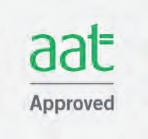
▪ DĞŵďĞƌƐŚŝƉ�ŽĨ�ŽƵƌ�ǀŝďƌĂŶƚ�KŶůŝŶĞ�>ĞĂƌŶŝŶŐ��ŽŵŵƵŶŝƚLJ ĂŶĚ�ĂĐĐĞƐƐ�ƚŽ�Ă�ĚĞĚŝĐĂƚĞĚ�ƚƵƚŽƌ
▪ ,d&d�WĂƌƚŶĞƌƐŚŝƉ�ƐƚƵĚĞŶƚŶŽƚĞƐĂŶĚ������ĂƵƚŚŽƌŝƐĞĚ�ƐƚƵĚLJ�ƚĞdžƚ �ĞdžĂŵ�Ŭŝƚ�ĂŶĚ�ƉŽĐŬĞƚ�ŶŽƚĞƐ
▪ &Ƶůů�ƐLJůůĂďƵƐ �dŽƉŝĐ�ďLJ�dŽƉŝĐ�ƌĞĐŽƌĚŝŶŐƐƐƵƉƉŽƌƚĞĚ�ďLJ�dƵŝƚŝŽŶ DĂƐƚĞƌĐůĂƐƐ�ƌĞĐŽƌĚŝŶŐƐ – ĚŽǁŶůŽĂĚĂďůĞ�ĂŶĚ�

▪ Scheduled ‘live online’ ZĞǀŝƐŝŽŶ DĂƐƚĞƌĐůĂƐƐ�ƐĞƐƐŝŽŶƐ�– ƌĞĐŽƌĚĞĚ �ĚŽǁŶůŽĂĚĂďůĞ�ĂŶĚ�ƉůĂLJĂďůĞ�ŽŶ�Ăůů�ĚĞǀŝĐĞƐ

▪ ,d&d�ĐŽŵƉƵƚĞƌ�ďĂƐĞĚ�ƚĞƐƚƐ�ĂŶĚ�ŵŽĐŬ�ĞdžĂŵƐ �ŵĂƌŬĞĚ ǁŝƚŚ�ĂŶƐǁĞƌƐ�ĂŶĚ�ǀŝĚĞŽ�ĚĞďƌŝĞĨƐ &Žƌ�ŵŽƌĞ�ŝŶĨŽƌŵĂƚŝŽŶ�ǀŝƐŝƚ�ǁǁǁ
^ƚƵĚLJ��/D� �ĐŚŽŽƐĞ�,d&d
KƵƌ�,d&d ůŝǀĞ �,d&d ŽŶ ĚĞŵĂŶĚ�ĂŶĚ�,d&d ƉůĂLJ�ƌĞƐŽƵƌĐĞƐ�ĂƌĞ�Ăůů�ŚĞƌĞ�ƚŽ�ŚĞůƉ�LJŽƵ�ƉƌĞƉĂƌĞ�ĨŽƌ �ĂŶĚ� ƉĂƐƐ �LJŽƵƌ�ĞdžĂŵ

,d&d ůŝǀĞ �ũŽŝŶ�ŽƵƌ�ĞdžƉĞƌƚ�ƚƵƚŽƌƐ�ůŝǀĞ�ŽŶůŝŶĞ�ĨŽƌ�ŝŶƚĞƌĂĐƚŝǀĞ�DĂƐƚĞƌĐůĂƐƐĞƐ �ĚĞƐŝŐŶĞĚ�ƚŽ�ƐƵƉƉŽƌƚ�LJŽƵƌ�ĂƉƉůŝĐĂƚŝŽŶ�ŽĨ�
,d&d ŽŶ ĚĞŵĂŶĚ �ĚƌŝǀĞ�LJŽƵƌ�ůĞĂƌŶŝŶŐ �ǁŝƚŚ�ĨƵůů�ĨůĞdžŝďůĞ�ƌĞƐŽƵƌĐĞƐƚŚĂƚ�LJŽƵ�ĐŽŶƚƌŽů
,d&d ƉůĂLJ ��ŽdžƐĞƚƐ�ŽĨ�ƚŽƉŝĐ�ƌĞĐŽƌĚŝŶŐ�ĂŶĚ�WƌŽĨŝĐŝĞŶĐLJ�ĞdžĂŵ ƐƚLJůĞ�ƉƌĂĐƚŝĐĞ�ĂƐƐĞƐƐŵĞŶƚƐ




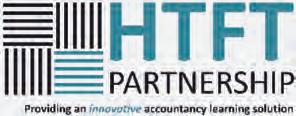
&Žƌ�ŵŽƌĞ�ŝŶĨŽƌŵĂƚŝŽŶ�ǀŝƐŝƚ
tĞ�ŚĂǀĞ�ůŝǀĞ��Ϯ �WϮ ��ϯ�ĂŶĚ�Wϯ�ĐŽƵƌƐĞƐ�ƐƚĂƌƚŝŶŐ�ĞŶĚ�ŽĨ�:ƵŶĞ ĞĂƌůLJ�:ƵůLJ
>ŝǀĞ�K�^�ĨŽƌ��ƵŐƵƐƚ�ƐƚĂƌƚƐ�ĞŶĚ�ŽĨ�:ƵŶĞ �ĂŶĚ�ůŝǀĞ�D�^ ^�^�ĨŽƌ��ƵŐƵƐƚ�ƐƚĂƌƚ� ĞĂƌůLJ�:ƵůLJ
ŽĨ�ƚŚĞ�zĞĂƌ�ϮϬϮϬ
ĞdžĂŵƐ
ƉůĂLJĂďůĞ�ŽŶ�Ăůů�ĚĞǀŝĐĞƐ
ŚƚĨƚƉĂƌƚŶĞƌƐŚŝƉ ĐŽ ƵŬ ĐŽƵƌƐĞƐ ĂĐĐĂ
^ƚƵĚLJŝŶŐ��/D�
ƐLJůůĂďƵƐ�ŬŶŽǁůĞĚŐĞ
�ǁǁǁ ŚƚĨƚƉĂƌƚŶĞƌƐŚŝƉ ĐŽ ƵŬ ĐŽƵƌƐĞƐ ĐŝŵĂ ^ƚƵĚLJ ǁŝƚŚ ,d&d WĂƌƚŶĞƌƐŚŝƉ ǁŚLJ ǁŽƵůĚ LJŽƵ ŐŽ ĂŶLJǁŚĞƌĞ ĞůƐĞ tŚLJ ǁŽƵůĚ LJŽƵ ŐŽ ĂŶLJǁŚĞƌĞ ĞůƐĞ &Žƌ ŵŽƌĞ ŝŶĨŽƌŵĂƚŝŽŶ ĞŵĂŝů ŝŶĨŽΛŚƚĨƚƉĂƌƚŶĞƌƐŚŝƉ ĐŽ ƵŬ ǁǁǁ ŚƚĨƚƉĂƌƚŶĞƌƐŚŝƉ ĐŽ ƵŬ KŶůŝŶĞ��ŽůůĞŐĞ�ŽĨ� ƚŚĞ�zĞĂƌ�ϮϬϭϳ WĞƌƐŽŶĂůŝƚLJ�ŽĨ� ƚŚĞ�zĞĂƌϮϬϭဒ WƌŝǀĂƚĞ�^ĞĐƚŽƌ��ŽůůĞŐĞ�
PREM SIKKA
ACCA exam fees are up

Profiteering is real cause of inflation
The UK rate of inflation, as measured by consumer retail price index, rose by 8.7% in 12 months to April 2023. This is higher than in Belgium (3.3%), Spain (3.8%), Greece (4.5%), Denmark (5.6%), Netherlands (5.8%), Ireland (6.3%), Finland (6.3%), France (6.9%), Portugal (6.9%), Germany (7.6%), Sweden (7.7%) and the EU average of 8.1%. The differences can’t easily be explained by the impact of Covid and Ukraine war.
Profiteering is a major reason for higher prices. Gross profit margins at big UK companies are the highest for a decade. Profit margins at FTSE350 companies are 89% higher than in 2019. Profits at Tesco, Sainsbury’s and Asda have doubled since 2019. Shell reported profits of £32bn, the highest in its 115-year history. British Gas’s 2022 profit of £3.3bn is nearly three times its 2021 profit. Between 2019 and 2021, the four global giant agribusiness corporations (ADM, Bunge, Cargill and Louis Dreyfus) increased profits by 255%. Eight top shipping firms boosted profits by 20,650%. Since 2019, profits of major road freight operators have increased by 149%.
Inflation has not been stoked by wage rises. The average real pay of workers is lower than in 2007.
Around 14.4m Brits are living in poverty and three million rely upon foodbanks for survival.
The government response is to push for real wage cuts with no curbs on prices or profiteering. This is a recipe for impoverishing millions and won’t help to build a sustainable economy.
Prem Sikka is Emeritus

Professor of Accounting at the University of Essex
ACCA has unveiled its exam fee rises for September 2023, and they amount to hikes of 5% – 7.5%.

To justify the rise it points to increased investment in remote invigilation and the provision of My Exam Performance, along with a new Study Hub. Students should not forget too that in September 2020 ACCA did not increase exam fees for the following year.
ACCA has different fees according to where you are in the world. The SBL entrance fee for UK students has gone up £18 to £263. SBR also broke the £200 barrier for the first time and will now cost sitters £204 a time.
The SBR exam in India and Sri Lanka will now cost £170 (up £6) and in South Africa it went up £13 to £185.
The Applied Skills paper rates for September 2023 are £154 in the UK and £135 in India. The final option papers are also £204 for UK sitters
New learning tools help close the skills gap
AICPA & CIMA have launched a new online learning platform to help accounting and finance professionals improve and update their skills, so they can take advantage of an accelerating digital business environment.
According to a 2021 World Economic Forum report, more than half of all employees worldwide will need to reskill or upskill by 2025. To address this need the new system
boasts single-platform availability, enhanced navigation and other tools that foster emerging technologydriven skills. It will provide access to the world’s largest accounting association’s learning content, including its portfolio of webcasts, certificates, guides and other CPE courses as a one-stop shop.
Michael Grant, AICPA & CIMA senior director of Learning Innovation & Assessment, explained:
and £170 for those in Sri Lanka.
One student in India said they were peeved that ACCA was increasing exam fees by 7.5%. As the SBL exam is no longer a fourhour exam they wondered why the fee was still going up, rather than down!
There is a genuine worry that students in countries where there is high inflation and currency depreciation are also struggling to pay the new increase.
One student said: “It’s way too expensive, I can’t afford to study for professional exams anymore. I’m part qualified but still can’t find a job to afford my studies.”
“The re-imagining of our learning portfolio represented an opportunity for us to rethink, refresh and transform our approach.
“Our new system offers dynamic learning journeys, which will allow accounting and finance professionals to address the skills they need to remain relevant using consistently updated course material.”
Quicker route to AAT membership

AAT has introduced a quicker and hopefully easier route to membership, once a student finishes their final Level 4 assessment.
A prescriptive CPD programme now replaces the need for students to show they have obtained suitable work experience.
All those who have passed the
100 new Deloitte partners
Deloitte has promoted over 100 new partners to the UK business. Of these 40% are women, bring the total number of Deloitte women partners to 386 (29%).
Some 18% of new partners are from ethnic minority backgrounds. Of these three are black, which bring the total of black UK partners to 15 (which doesn’t sound a lot). Overall, there are 131 partners identifying as ethnic minority, representing 10% of the firm’s total partners.
The total number of UK partners now stands at 1,315 – up 8% from 1,218 last year.
Overall, the firm promoted over 7,200 people
Level 4 exam and completed their fit-and-proper checks can pay the fee and become a member.
During the first nine months of membership, AATs will now need to undertake CPD modules in ethics, sustainability and leadership. There are eight modules in all to complete.
The association believes this move aligns with its desire to create
(30%) across all grades and business areas.
Bonuses slashed at KPMG
KPMG has slashed the bonus pot of its UK workers and lowered commission for sales people as profits falter amid a slowdown in dealmaking this year, according to reports in CityAM.
In a mid-year update staff were told that some bonuses would be cut by as much as 50%, and sales staff were told their commission might not be paid until the end of 2023.
A spokesperson for KPMG told CityAM that payouts for UK staff had been hit by market conditions. They said: “A challenging economic environment at the start of our financial year saw a softening in the deals market, and some clients
open access to an accountancy career. AATs will, however, need to complete the CPD pathway to remain a member, and there is no final test at the end of the modules.
Students on several noticeboards seemed confused by the changes, so PQ magazine asked AAT to provide an article on the progression pathway. You can read it on page29
defer projects to later in the year; this dynamic has affected the performance of some areas of our firm.”
Leadership shake-up at EY
EY has shake-up its UK leadership team just weeks after the collapse of its global breakup plans.
Sky News has reported that one of EY’s top UK-based executives, Alison Kay, is moving to a European role, which potentially removes her from the running to become the next UK boss. Kay was many insiders favourite to replace Hywel Ball, EY UK’s managing partner.
In a memo to partners, EY said it was slashing the size of its executive committee from 13 to 8.

8 PQ the PQ Magazine July 2023
news
ICAEW final exams stay in July
The new ICAEW final level exam dates are out for 2024 and some students are disappointed they are still taking place in July and November.
PQ magazine ran a lead story in September 2022 asking whether it was now ‘Too hot to sit exams in July’ after students were forced to sit exams in heat of 40+ degree Celsius. “That’s just not fair,” one ICAEW student told PQ magazine. As another student said at the time: “Global warming is not going
BPP launches ACCA ePubs
away, and it is only going to get hotter.”
Students also wondered why the Advanced Level exams took place in July and November and weren’t six months apart. Those failing in November have to wait eight months to resit, while those sitting in the summer wait just four.
It has been suggested that ICAEW have disregarded students’ health and safety in favour of keeping the administrative status quo.
International students boost
New figures show the economic benefit of international students rose from £31.3 billion to £41.9 billion between 2018/19 and 2021/22.
A new report, The costs and benefits of international higher education students to the UK, reveals the growing importance of international students to local economies throughout the UK.

The net economic impact of international students has seen

a dramatic rise over the past few years – up 58% since 2015/16 (£23.6 billion to £37.4 billion). One reason for this is the 68% rise in the number of new international
An ICAEW spokesman said that it will be consulting students, employers and tutors about the future timings of the exams and the logistics about moving them. He said: “While we have the dates in for 2024 they may change.”
students (350,145 in 2021/22) from non-EU countries since 2018/19.
Data from the report shows that every 11 non-EU students generate £1 million worth of net economic impact for the UK economy – or £96,000 per non-EU domiciled student.
The report was published jointly by Universities UK International (UUKi), the Higher Education Policy Institute (HEPI) and Kaplan International Pathways in collaboration with London Economics.

Following the soft launch at the ACCA Tutors’ Conference, BPP has unveiled its brand-new ACCA practice and revision kit ePubs.
Although BPP’s printed and eBook materials for the new 2023/24 editions have been out since March, its teams have been working hard to build new ePubs, which will offer students a different way to engage with BPP’s eBooks.
The ePubs are embedded with videos and weblinks, and represent the OTQs in the same way as they appear in the ACCA exam. Students will be able to submit responses and check their answers as they go. A mark will be allocated if correct, and full feedback will be provided to students should they get something wrong.
For constructed response questions (CRQs) the new ePub gives access to a blank CBE workspace that simulates the ACCA word processor and spreadsheet solution space, where students can complete their answer, reveal the suggested solution and then selfmark.
PQ 9 PQ Magazine July 2023 PQ news
Find out more at ifa.org.uk/ifadirect or call our Education Team now on +44 (0)20 3567 5999 Offer a range of accountancy-led services to the general public in the UK when you gain an IFA practising certificate through IFA Direct. The flexible, relevant and accessible study units provide structured learning designed to complement busy lifestyles. Online education programme Regulated Ofqual IFA AD H136mm x W192mm.indd 1 19/01/2023 16:16
ANNA KATE PHELAN
AI: should we worry about our privacy?

New IFAC guidance on greenhouse gas reporting
New guidance to help accountants and finance professionals deliver robust greenhouse gas (GHG) reporting has been released by the International Federation of Accountants (IFAC) and We Mean Business Coalition (WMBC), in partnership with Accounting for Sustainability (A4S), Global Accounting Alliance (GAA) and World Business Council for Sustainable Development (WBCSD).
The first part of the guidance, 8 Steps to Enhance GHG Reporting:
A Roadmap for Accounting and Finance Professionals, provides finance and accounting professionals with a roadmap to engage with others across their
business to prepare for GHG emissions reporting requirements aligned to financial reporting processes. The second, GHG Reporting Building Blocks for Accountants, equips accountants with the technical guidance necessary to collect and enhance the quality of data related to all scopes of GHG emissions at individual entity and group levels.
IFAC CEO Kevin Dancey (pictured) said: “The release of this guidance is a significant step towards enabling professionals to prepare for the increasing demand for investor-grade climate reporting by aligning GHG emissions accounting with financial accounting.”

Your CIMA case study pass rates
CIMA has finally released the pass rates for the February case study sitting – and they are a bit of a mixed bag.
Students sitting the first Operational Case Study exam for 2023 achieved a 68% pass rate. That is higher than any pass rate in 2022, and two percentage
points higher than last November.
The Management Case Study February pass rate was also up on November 2022 – from 71% to 72%.
The worry is the Strategic Case Study pass rate, which has dipped to just 56%. The final case study
pass rates seem to jump around a lot more than the other case study pass rates, too. In February 2022 the pass rate for the SCS was a very respectable 72% – some 16 percentage points higher than this February.
CIMA’S CGMA CASE STUDY PASS RATES
basis that justifies the massive collection and storage of personal data”. OpenAI, which owns ChatGPT, subsequently allowed users to opt out of data processing using an online form. However, this process is cumbersome and is not an option on registration with the platform.
The space is rapidly evolving and users, along with regulators, must be vigilant in weighing up the positives against the risks.
Ann a Kat e Phelan is Head of Product at

Eintech
Premier Training offers ICB
Premier Training is offering free Live Lessons with its newly-launched ICB Level 2 Certificate in Bookkeeping course.
The online sessions, hosted by Programme Manager Sam Hannigan, will be available throughout June for students who begin the new course.
Hannigan will guide students through the opening A1 unit of the qualification, to assist with their ICB
Taxwatch
Tax havens under scrutiny
It would appear that HMRC is tracking an increasing number of UK firms suspected of using tax havens, according to a Freedom of Information request from Pinsent Masons.
The law form discovered the UK tax authority is now following 512 firms that do not seem to have enough business activity in those tax havens to legitimately claim they are operating there. Last year there were just 277 firms on that same list, so that’s an increase of
88% year-on-year.
IASB amends tax accounting requirements
The International Accounting Standards Board (IASB) has issued amendments to IAS 12 Income Taxes. The amendments give companies temporary relief from accounting for deferred taxes arising from the Organisation for Economic Co-operation and Development’s (OECD) international tax reform.
The OECD published the Pillar
studies and progression.
The Institute of Certified Bookkeepers (ICB) Level 2 qualification comprises three units, each with their own online assessment that can be taken in the candidate’s home or place of work.
Rose Crockett, Premier Training Operations Director, said: “We are delighted to launch our new ICB Level 2 Certificate in Bookkeeping course – it’s a fantastic way for
Two model rules in December 2021 to ensure that large multinational companies would be subject to a minimum 15% tax rate. More than 135 countries and jurisdictions representing more than 90% of global GDP have agreed to the Pillar Two model rules.
The IASB has taken urgent action to respond to stakeholders’ concerns about the uncertainty over the accounting for deferred taxes arising from the implementation of the rules.
anyone to start their professional bookkeeping journey.
“ICB qualifications are highly valued around the world, and enable individuals working in bookkeeping and finance to enhance their CV and progress their career.
“ICB qualifications also generate benefits for employers and SMEs (small and medium-sized enterprises). Every business is required by law to ‘keep books’ – and keeping accurate records makes sound business sense.”
Tax revenues bounce back in Latin America
Tax revenues as a share of GDP in Latin America and the Caribbean (LAC) rebounded to their prepandemic level in 2021 amid an economic recovery and higher commodity prices, according to a new OECD report.
The report shows that taxto-GDP ratios in the LAC region ranged from 12.7% in Panama to 33.5% in Brazil in 2021. The ratio increased in 18 of 25 countries between 2020 and 2021.
10 PQ the PQ Magazine July 2023 tax news
FEB 22 MAY 22 AUG 22 NOV 22 FEB 23 OCS 62%62%66% 66%68% MCS 73%82%69% 71%72% SCS 72%62%58% 71%56%
AI is set to revolutionise life as we know it and regulators are struggling to keep up. The technology has seen an explosion in efficacy and with it a to-beexpected surge in popularity. Currently, we do not appear to be able to access AI services like ChatGPT without first consenting to the use of our data. This makes sense as the language model utilises each interaction in order to improve. However, it does beg the question, do we have to give up privacy as we know it to move with the times? The UK information commissioner has recently reminded AI companies that they are subject to data protection laws. Regulators are more and more concerned when it comes to AI’s impact on privacy. Along with concerns about personal data from interactions with users being utilised by AI, there has also been a spotlight on the massive amounts of data these companies are gathering from the internet, some of which may be personal. The data protection authority in Italy has blocked ChatGPT, saying there was “no legal










Get your head around the new question types from AAT. Get Rogo. Easily create accurate practice exams with Rogo’s question types, matching the new formats from AAT assessments. Visit getrogo.com to learn more
DAVID ROTHERA
Two councils reprimanded over data request failure
The Information Commissioner’s Office (ICO) has reprimanded two councils for failing to respond to the public when asked for personal information held about them –known as a Subject Access Request (SAR).
La
Both Plymouth City Council and Norfolk County Council repeatedly failed to meet the legal deadline of one to three months for responding to a SAR. The ICO has issued a reprimand to both councils, instructing them to take steps to ensure that the public receive their

personal information within the statutory period.
Following enquiries, the ICO
found that Norfolk County Council had only responded to 51% of SARs on time between April 2021 and April 2022, meaning that 251 residents did not receive a response within the legal timeframe.
Delays were also found at Plymouth City Council over the last three years, with 18 requests taking up to two years to complete and a further 18 requests taking between three months and one year. There were 20 outstanding requests up to a year old, and eight requests still outstanding up to two years old. The highest compliance rate for SARs completed on time was 77% in 2022-2023.
sy to jump onto, but as commentators from all quarters pile in, are we in danger of the mob smothering the flame. So is ‘green-wagoning’ derailing net zero?
This is something we’re more and more aware of with our accountancy clients as they progress on their net zero journey. Although our clients aren’t required to purchase and retire carbon credits until they’ve reduced their emissions by at least 90% (a process that will take years), some had chosen to go an extra step and compensate for their emissions, on top of implementing reductions strategies. Since The Guardian report, there has been a noticeable shift in our clients’ attitude towards compensating for their emissions, with many choosing not to purchase and retire carbon credits for fear of being accused of greenwashing. Carbon offsets are an essential part of any credible corporate net zero plan – no question. Yet those that provide and use them find themselves under repeated attack in the press, as the veracity of the claims they make is questioned. The persistent chipping away serves only to undermine the credibility of offsetting per se.
David Rothera is Climate Project Manager at Net Zero Now

Moving to a digital audit world
Aston University has begun a management Knowledge Transfer Partnership (mKTP) with accountants Beever and Struthers, to help drive the firm’s digital transformation.
As part of the mKTP, led by Aston University in collaboration with Professor Brian Nicholson and Dr Sung Hwan Chai (Alliance Manchester Business School), Dr George Moyenda Salijeni (Aston Business School) and the team will conduct a comprehensive evaluation of Beever and Struthers’ existing data systems. Following the assessment, specific methodologies will be proposed to ensure
alignment between the mKTP and the firm’s ongoing data systems.
The 30-month programme will aim to develop, embed and exploit smart data-driven technologies within the audit function, enabling the business to increase the quality, productivity and capacity to deliver additional insight and value to clients.
Salijeni, a lecturer in accounting at Aston Business School, said: “Potentially, this project will generate insights and workflows which could impact and transform the way audits are performed, by leveraging data-driven analytics tools and models.”
Pictured (l-r) are: Michael Tourville (Partner, Beever and Struthers), Professor Brian Nicholson and Dr Sung Hwan Chai (AMBS), and Dr George Salijeni (Aston Business School)

Staff details stolen via payroll provider Zellis
British Airways, the BBC and retailer Boots are among the companies hit by a cyber-attack on payroll provider Zellis, which is used by hundreds of companies in the UK.
The hackers targeted a thirdparty file supply company MOVEit, which is used by Zellis, and it could mean they now have access to
NI numbers, salary and contact details, sort codes and account numbers of literally hundreds of thousands of staff across the UK and further afield.
The hack came through the file transfer tool.
Boots has confirmed the data breach had gained access to some
Capita cyber-attack will cost up to £20m
Outsourcing giant Capita has revealed that the cyber-attack against it that saw personal information leaked onto the dark web will cost it between £15m and £20m to ‘put right’.
Capita said it is working closely with all appropriate regulatory authorities and with customers, suppliers and employees to notify those affected and take any remaining necessary steps to address the incident.
The firm said in an update: “Capita understands now, based on its own forensic work and that of its third-party providers, that some data was exfiltrated from less than 0.1 per cent of its server estate.”
Facebook fined £1 billion Meta, the owner of Facebook, has been fined £1 billion for the mishandling of people’s personal data by Ireland’s Data Protection Commission (DPC).
The DCP said Meta infringed GDPR rules (Article 46-1) when
transferring data from the EU to US
Meta is not happy and has said it will appeal against what it called an “unjustified and unnecessary” ruling.
Facebook president Nick Clegg said: “We are disappointed to have been singled out when using the same legal mechanism as thousands of other companies looking to provide services in Europe.
“This decision is flawed, unjustified and sets a dangerous precedent for the countless other companies transferring data
between the EU and US.”
Meta sells Giphy
Meta has taken a huge hit after it was forced to sell animatedimages platform Giphy to Shutterstock for £48m.
It was reported that Meta paid around £325m for Giphy in 2020, but a year later the deal was challenged by the UK Competition & Markets Authority. It is the first time that a UK regulator has forced a US tech giant to sell a company it had already acquired.
12 PQ the PQ Magazine July 2023
Tech
tech news
briefs
of its employee’s personal data. BA emailed its staff, warning them that their personal details may have been compromised by the attack, which led to the “disclosure of personal information about colleagues paid through British Airways’ payroll in the UK and Ireland”. st month, a Guardian report on the challenges faced by the voluntary carbon market raised questions (again) about the role of carbon offsets in corporate climate strategy. This month it reported how the UK advertising watchdog was launching stricter enforcement over terms like carbon neutral. It’s an anti-greenwash bandwagon that’s all too ea
Are media reports harming net zero efforts?

AAT must step up
What is happening at the AAT?
First, they introduce assessments that don’t work for Q2022, and then they tell us the exams they actually set at Level 4 are too hard!
I am one of the students who took Level 4 AUDT and failed. It now appears I am being told I have passed, thanks to the 10% uplift. In fact, I have passed twice now, which seems a bit bizarre. I am expecting a refund for at least one of those sittings. Although I won’t get back my time and those sleepless nights!
It all seems a bit arbitrary, as a colleague who sat INAC only received a 5% uplift, which wasn’t
Our
From AAT to MAAT


Can someone at PQ magazine ask the AAT about the changes it has made to become a MAAT –member of AAT? I understand there is now a CPD pathway that must be completed before being able to apply for MAAT status. This is a new requirement that has not been notified to centres or current Level 4 students, but I understand the changes came in last November! I was also wondering what happens if students fail the CPD – does it mean they can’t become members?
Name and address supplied
The Editor says: Your wish is our command! AAT has explained all for you in this issue. You will see that Level 4 students will now get membership straight away and have nine months to complete the required CPD programme. This is instead of proving your work experience. Here at PQ magazine we think this is a great move and will ultimately help your employability.

No split decision


I loved Paul Merison’s piece in the latest issue about breaking up the Big 4 (PQ, June ’23 issue). It was refreshing to see someone putting some different solutions forward. I particularly like the idea
quite enough to turn their failure into a pass. If they were given 7% they would have passed. They told me that task 2 was for 25 marks and they doubted if anyone got higher than eight or
nine on that task, which in theory means they lost much more than the 5% given. I know quite a few people who have also complained about the way the questions were worded by the examiners. Surely AAT could have been a bit more generous with the mark uplifts. How can AUDT sitters get 10% and INAC just 5%?
Then there are the problems with Q2022. This just seems to be going on for months and months with no resolution. Why is it so hard to fix?
Name and address supplied
The Editor says: We are the case. There’s lots of feedback in this issue and AAT CEO Sarah Beale is in regular contact with us now.
PQ magazine believes the regular publication of pass rates is something all the accountancy bodies should do. We want them to be transparent and open about them, and they should be easy to find for PQs and prospective PQs. Unfortunately, this is not the case with all the professional accountancy bodies, and it is something we will be taking up with the Financial Reporting Council, particularly now that we have a new Professional Body Supervision (PBS) team. Part of its remit is ‘qualification and learning’.
The bodies almost seem to hide the pass rates on their websites, when they should be front and forward! They should also be using social media to publicise them.

There is a problem, however, because some of the exams are on demand. How do you make comparisons? It also making it impossible to know what the sitting was like, and this helps the bodies avoid online criticism from students.
Take CIMA, for instance. When students received their February case study results they went looking for the pass rates, but they were nowhere to be found. Students went online to see if fellow PQs knew what was happening.
of using the National Audit Office to audit all companies with a public interest, or where the auditor has been removed for quality reasons. I know that the Germany authorities have acted against the auditors of Wirecard, but I can’t remember this ever happening here in the UK.
If it happened more often it could change the whole way the industry in viewed.

Merison is right though, having an appetite and bravery to push change through just isn’t there. Which is a big shame for everyone!
Name and address supplied
They contact us too and we contacted CIMA. Apparently, they were having software issues, hence the delay. They have also promised us some dates when the results will be published moving forward (but we haven’t got them yet). The OT results are published just once a year, every November, and CIMA is publishing just one set of results now. We used to get three separate pass rates, so we knew what the first-time pass rates were, for instance.
14 PQ PQ Magazine July 2023
PQ Magazin e PO Box 75983, London E11 9GS | Phone: 07765 386489 | Email: graham@pqmagazine.com Website: www.pqmagazine.com | Editor/publisher: Graham Hambly graham@pqmagazine.com | Associate editor: Adam Riches | Art editor: Tim Parker Contributors: Robert Bruce, Prem Sikka, Lisa Nelson, Ann a Kat e Phelan, Tony Kelly, Phil Gammon, Edward Netherton | Subscriptions: subscriptions@pqmagazine.com | Origination services by Classified Central Media If you have any problems with delivery, or if you want to change your delivery address, please email admin@pqmagazine.com Published by PQ Publishing Ltd © PQ Publishing 2023
email graham@pqmagazine.com
star letter writer wins a fantastic ‘I love PQ’ mug!



















ACCOUNTANT with AAT BECOME AN Benefit from an excellent career, with an average salary of £30,000 a year* *Source: Payscale www.e-careers.com (accounting) +44 (0) 20 3198 7600 Mon - Fri | 9am - 6pm Excellent Why study with us? ✓ Selected courses include Online Training, Books, Live Online Classes and Tutor Support ✓ One of the largest AAT providers in the UK ✓ We have trained over 10,000 AAT students ✓ We won’t be beaten on price! ✓ High Pass Rates ✓ 0% finance payment plans available. VALUED BY EMPLOYERS AND BUSINESSES AROUND THE WORLD PRICE MATCH GUARANTEE* We will match like-for-like price.



Progress your studies the flexible way. Establish your expertise in the profession with the CGMA ® Finance Leadership Program (CGMA FLP). A digital-first learning and assessment platform, the CGMA FLP accelerates your route to the designation with flexible learning whenever and wherever you want. Founded by AICPA® and CIMA®, the Association of International Certified Professional Accountants® powers leaders in accounting and finance around the globe. © 2023 Association of International Certified Professional Accountants. All rights reserved. AICPA and CIMA are trademarks of the American Institute of CPAs and The Chartered Institute of Management Accountants, respectively, and are registered in the US, the EU, the UK and other countries. The Globe Design is a trademark of the Association of International Certified Professional Accountants. 2301-771946 Find out more at cimaglobal.com/CGMAFLP.
The stealth tax rise
One in five taxpayers are set to be paying the higher-rate tax by 2027 as thresholds freezes bite, says a new Institute for Fiscal Studies report
By 2027–28 the number of people paying income tax at 40% or above will reach 7.8 million – that’s one in five taxpayers and one in seven of the adult population – a near-quadrupling of the share of adults paying higher rates since the early 1990s.
This represents a seismic shift. New analysis by researchers at IFS shows that while in the 1990s essentially no nurses and just one in 16 teachers paid higher-rate tax, by 2027–28 more than one in eight nurses and one in four teachers are set to be higher-rate taxpayers. The six-year freeze to income tax allowances and thresholds which started in April last year is now set to become the single biggest taxraising measure since the then Chancellor Geoffrey Howe doubled VAT in 1979. It will play a major role in expanding the reach of higher rates over the coming years. The freeze will also compound challenges facing the many workers whose earnings are not keeping up with inflation – indeed, a third of the expected record fall in household incomes this year is likely to be a result of this tax rise. Other findings include:
• In 1991–92, 3.5% of UK adults (1.6 million) paid the 40% higher rate of income tax. By 2022–23, 11% (6.1 million) were paying higher rates, with that figure set to reach 14% (7.8 million) by 2027–28.
• Of that 14%, 3.1% of adults (1.7 million) will face marginal tax rates of either 45% or 60%. (The 60% rate kicks in at £100,000 and the 45% rate at £125,140.) That’s almost as large a share as paid by 40% higher rate at the start of the 1990s.
• That means that for the 40% rate to impact the same fraction of people as it did in 1991, the higher-rate threshold would need to be nearly £100,000 in 2027–28 – almost double its actual level of £50,270.
In the space of 40 years, higher rates of income tax will have gone from being a feature of the system reserved for those with the very highest incomes, to one that impacts a far more substantial proportion of the population. The 60% and 45% rates now play much the same role as that which the 40% rate used to play.

Isaac Delestre, Research Economist at IFS, said: “For income tax, the story of the last 30 years has been one of higher-rate tax going from being something reserved for only the very richest, to something that a much larger proportion of adults can expect to encounter. Alongside the fact that 1.7 million people will be paying marginal rates of 60% and 45% in the
next few years, this represents a fundamental and profound change to the nature and structure of our income tax system.
“The freeze to thresholds is supercharging that process, pulling an additional 2.5 million more people into paying rates of 40% or more by 2027–28. Whether or not the scope of these higher rates should be expanded is a political choice as much as an economic one, but achieving it with a freeze leaves the income tax system hostage to the vagaries of inflation –the higher inflation turns out to be, the bigger impact the freeze will have.”
Read the full report at https://tinyurl.com/ mr43tjuw


PQ 17 PQ Magazine July 2023 income tax






For more information and to receive 15% off your ICB Exemption application, call ICB HQ on 0203 405 4000 and quote ICBPQ Email us at exemptions@bookkeepers.org.uk www.bookkeepers.org.uk/PQ PQ with AAT, ACCA, ICAEW or CIMA? Why wait? Join ICB today! Fast track your career by using your existing qualifications to join the world’s largest bookkeeping organisation. As a Certified ICB Bookkeeper you’ll benefit from: Professional status and recognition Free legal and technical advice-line Local and national events Resources, webinars, templates and help sheets Accounting news, emails and updates Discounts with 100s of retailers including Sainsbury’s, Tesco, ASOS, and Curry’s And being part of a community that really cares The Institute of Certified Bookkeepers we are on your side FIN A COURSE Save time to find your next accountancy course with PQ Coursefinder. Go to www.pqmagazine and click on the COURSEFINDER bar. Find a course with a top provider that ticks all your boxes. Save money. Save time. Use PQ magazine’s Coursefinder.
Seeing and doing
Come September, ACCA is adding pre-Seen material to the Strategic Business Leader case study. Here the association explains how it will all work

September brings an exciting change for ACCA’s Strategic Business Leader (SBL) case study exam. We’re delighted to share the details here with you, together with some top tips from the examining team on how to approach the pre-seen material and the exam to help you maximise your chances of success.
From the September 2023 exam session, pre-seen information relating to the SBL exam will be shared with students and tutors two weeks in advance of the exam. This will give students the opportunity to absorb the information presented and avoid those exam day nerves that come with seeing an industry and organisation for the first time, which we know for some students can be daunting.
We understand that employers value employees with strong professional skills and so these skills continue to be examined within the SBL exam. With the introduction of preseen material there will be less new content to read during the exam time, so students will be better able to demonstrate their strategic thinking and professional skills.
In addition to being more inclusive, preseen material will also help students manage the exhibits on the exam day, as students will already be familiar with the organisation on which the case study is based.
Students should also note that with the introduction of pre-seen material, the duration of the SBL exam will be reduced to three hours and 15 minutes, which is the same as other Strategic Professional exams.
What’s not changing?
While the introduction of pre-seen material for the SBL exam is a big change, it’s important to note what’s not changing. The main objective of the exam remains unchanged, and that is to continue to offer an exam that focuses on the application of knowledge and includes strategic thinking, business direction and problem solving to prepare students for the workplace. We know that employers love the range of skills developed through SBL and so these remain.
The syllabus will largely remain the same
and the SBL exam will continue to be an integrated case study in which all tasks relate to a single case study scenario. Students will continue to be given a role or roles that they will assume as they carry out various tasks in the case study.
Using the pre-seen material
The pre-seen material will be released to both students registered for the next SBL exam and learning partners at the same time. You may decide to do some research to better understand the terminologies and activities which are mentioned in the pre-seen; however, there is no expectation that students undertake further research unless it is to gain clarification of the terminology or issues presented in the pre-seen. The SBL exam is

based on a fictitious organisation and the exam tasks will relate to this organisation specifically and not to any general research that students may have undertaken. All the relevant information will be contained either in the preseen material or in the exhibits provided in the exam on the day.
The pre-seen information is contextual only, you will not be able to guess what questions will be asked in the exam. So use your time getting familiar with the terminology, ensuring you understand the key information provided and reading the pre-seen material to fully understand the activities of the fictitious organisation and the industry in which it operates. Spend time familiarising yourself with the terms and activities including the products/ services, types of customers and suppliers, developments, risks, etc..
Supporting you to maximise your success
Like all exams, there is no substitute for good preparation, and we have a whole suite of resources to support you as you prepare for the new style SBL exam. All of our resources can be found online, including support from the examining team, detailed articles on the changes and an expert tutor video explaining the changes and how to approach the exam. You should make sure that you attempt the two new SBL specimen exams that are available on the Practice Platform. These would be perfect for practising your exam technique under exam conditions.
Be sure to keep an eye on our social media channels and look out for details on upcoming webinars that will guide you through the changes and help you understand how to use the pre-seen material to your advantage – and also advise what you shouldn’t use it for.
The Strategic Business Leader exam is often cited as the exam that best replicates the workplace, and we believe that the introduction of pre-seen material brings the exam even closer. So do continue to read PQ, access the materials on accaglobal.com and check our social media as we continue to help maximise your success!.
• Thanks to ACCA for this article

PQ 19 PQ Magazine July 2023 ACCA SBL exam
� - ::::.. Sign up online for your free copy of PQ magazine Go to www.pqmagazine.com - simply click on the 'subscribe' button












Successful preparation for your case study exam
Nasheen Wuisman has some top tips on preparing for the case study, and points you in the direction of some valuable resources
Your focus is to pass the case study exam and you know that careful exam preparation is essential to pass. But what’s the right way to do this to give you the best chance of success?
Let’s start by understanding the aim of the case study exam.
Purpose of case study exam
The case study exam is a ‘role simulation’ that reflects real-world scenarios across a variety of organisations and industries. The simulations require a CGMA candidate to think and act like the finance professional they would be in the workplace.
Each case study comprises two separate elements:
• The pre-seen information is released in advance of the exam.
• The unseen information is provided on the day of the exam.
This format allows you to spend time thinking about, analysing and processing the pre-seen information before the exam. Then on the day, build on this background by receiving further, unseen information followed by your tasks. This approach aims to simulate decision making in a real-life situation.
Use the blueprints to prepare yourself
The exam blueprints for each of the three levels of the CGMA syllabus – Operational, Management and Strategic — outline your case studies and the role you are expected to take on in the exam, and the build-up to it.
The blueprints refer to the relevant syllabus content for each level, and CGMA candidates are expected to know this content and be able to apply it in the context of the case study. You’re expected to be able to formulate and structure a credible response from a superior or colleague. For example, the Management Level Case Study Exam question tutorial task features Grainger, which designs and manufactures mobile phones.
Candidates are asked about the challenges associated with transfer pricing for charges made by one part of the entity to another to reflect the transfer of resources. A candidate who doesn’t know what transfer pricing is, or what a target costing exercise involves, would struggle with this task.
It is therefore important to make sure you have a sound understanding of the syllabus content relevant to the level of case study you are studying towards.
CIMA also provides question tutorials for the other case study levels of the CGMA syllabus.

Know the pre-seen materials inside out
The pre-seen information is made available on
the CIMA website before the exam. It’s vital to study the pre-seen document and be extremely familiar with it before you go into the exam. Candidates should be able to understand the content and interpret the facts provided. In every case study, at every level, the nature of the entity provided will affect the advice you offer.
Once you get access to the pre-seen information relevant to your exam sitting, try to make sure you take the time to understand the industry you have been presented with, have an open mind and do not make assumptions. If you are unfamiliar with that particular industry, take the opportunity to research it and understand the risks it faces and opportunities available from a more general point of view. This understanding will go a long way towards analysing the entire content of the pre-seen material.
Let’s for example take, a recent sitting’s case study pre-seen materials at Managerial Level. The pre-seen information provides us with the background of Piping Beverages, a quoted company, who manufactures packed tea for sale to retailers. You are the Finance Manager.
One of the tasks related to this pre-seen asked candidates to recommend with reasons the style of leadership that the company should apply to a new acquisition company. The details of this new acquisition were presented in the unseen information on the day of the exam. To be able to attempt this task it is vital to understand the leadership Piping Beverages already takes, which is provided to you in the pre-seen; without
this background your answer can appear disjointed and irrelevant and will score poorly. You will not have time in the exam to work through the pre-seen information.














A planned answer is a great answer
• Hone your skills: Answering case study tasks requires specific skills underpinned by a good plan. The best way to hone your skills is through practice and understanding. Think of the tasks set in the case exam as if they were set at work. For instance, if you’re set a task in real life, the first thing you do is make sure you understand what the task requires.
• Read the task carefully: It may sound obvious, but examiners report that some candidates fail to answer the task set. It is easy to start answering a task you envisaged coming up instead of the actual task.
• Create a plan: Invest a few minutes in planning your approach to each task. Exam time pressures might tempt you to skip this step and start writing a detailed answer at once. But that’s likely to be a mistake. Planning is not a waste of time; it’s the best way to create a coherent argument and to balance and justify your arguments. It will help to maximise your marks.
• Use study materials: Reading and revising study materials is absolutely critical. It’s important to understand the theory that frames and informs accounting decisions. Then you must learn to adapt that understanding to support arguments about the specific scenarios in the case study exam.
Study tips
Revise all study materials applicable to your level. All case study exam tasks are compulsory so any topic could come up.
Use the blueprints to support your exam preparation. This gives you a great indication of what to expect.
Practice with past papers, preferably under timed conditions. Type out full answers, then review and learn from them.
Adopt a finance professional mindset when you are using all these resources and analysing the pre-seen materials.
Key dos and don’ts will guide and enable your success
What’s more, CIMA provides a wide range of support materials, including tips from examiners. You will find plenty of examples from all three levels of the CGMA syllabus, together with level-specific study materials.
For further resources visit the CGMA study planner and view a relevant exam session.
• Nasheen Wuisman, Senior Manager –Academic Progression Support, AICPA & CIMA
PQ 21 PQ Magazine July 2023 CIMA spotlight
A question for Tom
Our man Tom Clendon explains the upcoming changes to the Strategic Business Reporting paper


Question


What changes have been made to ACCA’s SBR examination?


Answer
From September 2023 the SBR exam will be different. Some things have radically changed, others more subtly. Some things remain the same.
The radical change
Q1 will test group accounts in a radically different way. While the academic level and syllabus hasn’t changed, the style of Q1 has. Students will be presented with a prepopulated spreadsheet showing a set of group accounts already prepared. Only these financial statements will somehow be incorrect, and so in need of updating. For 10 to 14 marks students will be tasked with inserting numbers in the spreadsheet columns to update and correct the group’s financial statements.
In addition to the number-crunching there will be the need for students to explain and contextualise the adjustments that have been made.
For the avoidance of doubt, while normally questions revolve around the group statement
of financial position, exam questions will continue to be set around the group statement of cash flow and the group profit and loss account.
The subtle change
The list of examinable documents for the September exam reveals that there are no exposure drafts. As such, the examiner team is looking to subtly reframe the theme of current issues into one of investor focus. Indeed, both SBR specimen exams now have examples of questions that specifically challenge students to comment on the significance of various accounting issues from an investor perspective.
No change
Knowledge of group accounts and IFRS and ethics and the conceptual framework will continue to be the backbone of the exam. I have no doubt that the exam will remain a challenging, time-pressured, technical and mainly written exam. Unlike other strategic professional exams there are only four professional marks. I remain convinced that students who have
DISCOVER THE FUTURE WITH ACCA’S CAREER NAVIGATOR

been taught to understand the principles, who have been coached in examination technique, and who have received constructive feedback on their assignments and mock exams will be well prepared and do well in this examination.
Comment
On one level it’s always slightly frustrating when changes are made to exams as it means extra work for me! Indeed, I have rewritten my online course to make sure that it remains exam focused so that I am teaching and revising my students on group accounts in the correct way.
However, I welcome this evolutionary change by ACCA. It means that the exam remains relevant to the workplace. It is after all more realistic to think that a qualifying accountant is adjusting and updating a set of financial statements on a spreadsheet rather than preparing them from scratch.
Further details
If you want further details about how you can pass SBR then you can contact me directly on WhatsApp – 07725 350793. You can access my YouTube channel at https://tinyurl.com/ywrhnue3
You can listen to my SBR podcasts at https:// tinyurl.com/mudb854r
• Tom Clendon is an SBR online lecturer and podcaster with the platinum provider FME LearnOnline and a double PQ award winner

PQ 22 PQ Magazine July 2023 ACCA SBR exam
Visit careernavigator.accaglobal.com
Wherever
you
are on your journey, our navigator guides your route – acquire new skills, explore career destinations and opportunities and grow your talent.
VAT on land and buildings made simple
In the latest article in his ‘Keep it Simple’ series, Neil Da Costa tackles a topic that students find challenging – VAT on land and buildings
There are four main aspects here: zero rated sales, standard rated sales, exempt sales, and option to tax. All the figures in this article are VAT exclusive.
Zero rated sales
Sales of new freehold residential and charitable buildings are zero rated for VAT purposes. This means that there is no output VAT, yet the sale is a taxable supply and all input VAT relating to the supply can be recovered in the usual way.
Simple example: Homes Plc
Homes Plc sells a new residential building for £1 million. The company spent £250,000 on expenses constructing the building, which was all standard rated.
What is the VAT position in relation to the residential building?
Solution to Homes Plc
Homes Plc can claim back the input VAT on the expenses relating to the residential building. £250,000 x 20% = £50,000 input VAT can be recovered.
The sale of the building for £1 million is zero rated so there is no output VAT charged on the sale.
Standard rated sales
Sales of new freehold buildings for commercial
purposes are standard rated for VAT. The standard rating applies within three years of construction.
Simple example: Offices Plc Offices Plc sells a new commercial building that is one year old for £1 million. The company spent £250,000 on expenses constructing the building, which was all standard rated.
What is the VAT position in relation to the commercial building?
Solution to Offices Plc
Offices Plc can claim back the input VAT on the expenses relating to the commercial building. £250,000 x 20% = £50,000 input VAT can be recovered.
The sale of the building for £1 million is standard rated so there will be output VAT charged on the sale.
£1,000,000 x 20% = £200,000 output VAT is payable by Offices Plc.
Exempt sales
Sales of old freehold buildings for commercial purposes are exempt for VAT. This applies to buildings three years old or more.
Simple example: Offices Plc Offices Plc sells a five-year-old commercial building for £1 million. The company spent
£250,000 on expenses renovating the building, which was all standard rated.
What is the VAT position in relation to the commercial building?
Solution to Offices Plc
Offices Plc cannot claim back the input VAT on the expenses relating to the commercial building as it is an exempt supply.
£250,000 x 20% = £50,000 input VAT cannot be recovered. This means that the net cost of the expenses is £250,000 + £50,000 = £300,000.
The sale of the building for £1 million is exempt from VAT so there will be no output VAT.
Option to tax
The owner of an old commercial building can make an irrevocable election to treat the exempt building as a taxable supply. The election must be filed within 30 days of signing and there is a six-month cooling off period. Thereafter, the election is binding for 20 years from the election date.
The effect of this is the input VAT relating to the building can be recovered but the sale of the building will result in output VAT at a rate of 20%.
The new owners are not bound by the seller’s election.
Simple example: Offices Plc
Offices Plc sells a five-year-old commercial building for £1 million. The company spent £250,000 on expenses renovating the building, which was all standard rated. Offices Plc has made an option to tax election.

What is the VAT position in relation to the commercial building?
Solution to Offices Plc
Offices Plc can claim back the input VAT on the expenses relating to the commercial building as it is a taxable supply.
£250,000 x 20% = £50,000 input VAT can be recovered. This means that the net cost of the expenses is just £250,000.
The sale of the building for £1 million is standard rated for VAT so there will be output VAT payable of £1 million x 20% = £200,000.
The new owners are not bound by the seller’s election.
Planning points
If the owner of an old commercial building plans on letting out the building to a tenant that is not VAT registered, it would not be beneficial to make an option to tax the building. This is because the tenant cannot recover the VAT charged on the rent so would make it more expensive to the tenant.
The option to tax a building takes priority over the transfer of a going concern exemption so if a building is included in the transfer of a business, VAT must be charged if an option to tax has been made.
Stamp duty land tax is always payable on the VAT inclusive cost of the building.
• Neil Da Costa is a senior tax lecturer with Kaplan, based in London. He is the author of Advanced Tax Condensed, which summarises the entire syllabus using memory joggers
PQ 23 PQ Magazine July 2023 VAT
Why the training never stops…
Young accountants who look to the future will reap the dividends, says the IFA
The skills required by an accountant
five years ago are different to those needed by the accountant of today. That’s because a combination of global change and regulatory requirements drive a constant adaptation of our skills. At the Institute of Financial Accountants (IFA) we highlight the value of continuing professional development as a cornerstone of your career.
John Edwards, CEO and Group Executive International of the IFA (pictured), explained: “In the last five years, we’ve seen regulatory and procedural change including Making Tax Digital and anti-money laundering updates, as well as the introduction of new legislation including the Plastic Packaging Tax. These, alongside a shift to

flexible at-home and hybrid working patterns, as well as a change in global trade, are changing the way that accountants are working.”
Edwards said: “The next decade looks just as progressive, with significant technological advances that will inevitably impact how we do business. Cryptocurrency will mature and become a credible business investment, AI will certainly streamline some of our practices, and sustainability assessments will become a mainstay of most of our business practices. For forward-thinking accountants, this offers opportunity for sustained, career-making advancements, assuming they opt for a growth mindset, and retain an appetite for continuing professional development.”
For part-qualified accountants, career futures will depend not only on understanding and embracing these advancements and adopting best practice, but also on understanding the potential of the technologies that drive them. For example, Blockchain, which currently underpins cryptocurrency, offers significant future advances in payment and transactional security around the world. While it will never be a likely expectation for accountants to become expert coders, directly harnessing the power of the tech, there will be a need to think critically and to embrace new technological formats to reap the rewards of the business practices that are to come.

Edwards concluded: “At a time when you are training, committing to more study may feel overwhelming. Yet adopting a progressive and future-focused mindset is a must to assuring your future success. Continuing professional development remains an afterthought for many, completed shortly ahead of CPD deadlines, rather than as an ongoing, annual plan.
“Our own research found that one in five accountants complete at least 50% of their annual CPD requirement within 30 days of deadline, and that one in 12 accountants don’t prioritise enough verifiable CPD each year. It is here that a more planned approach offers accountants significant gains.”
• Thanks to the IFA for this article. The IFA offer CPD courses, webinars, and events to support with skills development.
24 PQ PQ Magazine July 2023 IFA spotlight
ACCA Careers is dedicated to helping ACCA students develop their careers. With hundreds of entry level global job opportunities and over 400 career advice articles, we’re here to help you every step of the way. Visit jobs.accaglobal.com today
AAT’s Q2022: fewer ‘borderline’ results
First Intuition has taken a look at the first set of pass rates under Q2022. The data reveals far fewer ‘borderline results, but Level 3 is proving notably challenging
some, but not all, of the units:
challenging.
Here’s the unit-by-unit comparisons based on First Intuition’s students’ results:
Level 2
The pass rate for Principles of Bookkeeping Controls is noticeably lower than the first unit, Introduction to Bookkeeping. This is a similar story to the AQ2016 equivalent units.
Level 3
In the old level 3, the Advanced Bookkeeping unit and the Management Accounting: Costing unit were always challenging, but the two smaller units, Indirect Tax and Final Accounts Preparation, were relatively straightforward.
The new Financial Accounting: Preparing Financial Statements unit has combined the content of two units into one. If students are not confident in basic bookkeeping from level 2, it is a challenge to get them up to speed at the same time as covering all of the new content.
“Students either know their stuff and pass strongly, or they don’t have the depth of understanding required and fail badly,” according to Ali Ryder, AAT Production Manager at First Intuition, commenting on the Q2022 pass rates.

She added: “Qualifications 2022 is a fantastic qualification which is much better suited to the skills that are required of an accounting technician in today’s modern world. However, there is no getting away from the fact that it is a harder qualification than its predecessor.”
Since the launch of the new syllabus in September 2022, over 3,000 students from across the First Intuition network have sat a Q2022 assessment. First Intuition has since been monitoring student experiences and results, as well as the worldwide interim pass rates that were recently released by the AAT for
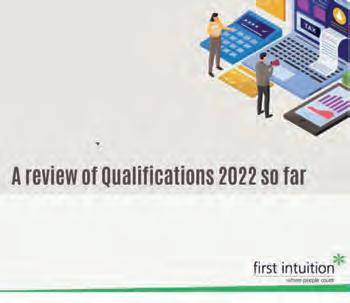
Note: the AAT has not released pass rates for the remaining units yet because they do not have sufficient data, but First Intuition expects full examiner reports to be released later this year.
While some of the results look promising (ITBK, POBC, AMAC and DAIF are all on par with their AQ2016 equivalents), the level 3 units (BUAW, FAPS and TPFB) are proving to be very
The new Tax Processes for Businesses is at the other end of the scale in terms of difficulty compared with Indirect Tax. As the worldwide pass rate demonstrates, this is now a challenging tax unit that focuses on some highly technical areas for this level of qualification.
Level 4
The AAT has not released pass rates for Internal Accounting Systems and Controls or Audit and Assurance yet, but these are regularly coming up in conversations about the challenges of the new syllabus.
Ryder said: “At First Intuition, we are very supportive of the evolution of the AAT qualification. It is more relevant, it prepares students better for progressing to one of the Chartered qualifications, and it should produce accounting professionals with broader technical, commercial and professional skills. However, there is no getting away from the fact that it is a harder qualification.”
You can find more information on this topic here.
PQ 25 PQ Magazine July 2023 new AAT qualification
Assessment name Worldwide AAT pass rate Introduction to Bookkeeping (ITBK)86.60% Principles of Costing (PCTN) 68.80% Principles of Bookkeeping Controls (POBC) 72.50% Business Awareness (BUAW) 61.90% Financial Accounting: Preparing Financial Statements (FAPS) 58.80% Tax Processes for Businesses (TPFB)52.90% Applied Management Accounting (AMAC) 67.80% Drafting and Interpreting Financial Statements (DAIF) 71.80%
Getting your exam preparation right
Cath Littler has some sage advice on how to make the most of your study time in the run-up to an exam
I’m often asked how to effectively prepare for exams and that question always makes me think of my Father who passed all his engineering exams by 1%; failure meant being conscripted into the military forces for WW2. Of course, it’s not quite that bad these days but some employment contracts do not allow trainees to fail exams, or they limit the number of resits that are acceptable before the trainee loses their job. So passing first time is still essential for some students.
The good news is that AAT exams are on-demand, so students don’t have a week of exams in June and December; candidates can sit one exam at a time, spreading them throughout the year. Results don’t take 12 weeks; most are instant, and the rest take only six weeks. Resits can be taken immediately for most assessments, and feedback tells us broadly what topics were found to be most difficult.
Set your targets
So how should you prepare for exams? Well, I start with the exam date and work backwards. A target date is important, continually delaying exams decreases pass rates.
Once you have your target date, allow time in the day or so before the exam to relax your brain. Our brains are like muscles, they can get fatigued and if you go into an exam with a tired
brain, it doesn’t work as well as it could. So the final preparation is to have eaten, be hydrated and be as rested as possible. Too many students turn up for exams having worked or crammed all day and are tired, stressed, hungry and ready to fail. Therefore, last-minute cramming needs to be managed to allow time for final revision on the topics that are still flagging as weak in your concluding revision stages.
Revise the challenging topics
Working backwards from your target date, consider the topics that you need to revise. Look at examiners reports, if they are available, to see where students are showing weaknesses
and add them to your list. Also look at the topics that you find hard. Often students waste revision time by going over the topics that they find easy. They congratulate themselves for having studied all day, but they have not contributed to their knowledge because they have worked on enjoyable tasks. Instead, roll up your sleeves and tackle the tricky topics.
Test yourself
Use AAT’s practice assessments as tests. Complete one of them early in your revision timetable and mark it using the answers provided by AAT before submitting. Note all the tasks that you found challenging and put in extra revision time for those topics.
Don’t make the mistake of doing the same practice assessments again and again, all you achieve is learning to pass the practice assessment – the actual assessments are likely to ask many different questions.
Use the second practice assessment as a final test a week before your exam. Again, focus on topic areas that you still struggle with and revise the whole topic, not just the questions in the assessment.
Practice writing
Finally, for all levels and all assessments, write about each topic, describing or explaining them. This has the dual effect of helping you to learn about the topics, and teaching you how to write – a skill you need in the workplace and increasingly in exams.
As for Dad having to pass exams to avoid being conscripted? Well, he eventually joined the military and spent the remainder of the war in the Royal Air Force, but his qualification meant that he spent the time working on radar sets which tracked aeroplanes – cutting edge technology at the time!
• Cath Littler, Head of Learning (Accounting) at Mindful Education



Cath brings a wealth of experience having coordinated the AAT’s largest FE training provider and as a published author. A former member of the AAT’s Learning and Development Board she has a track record of improving exam pass rates by 50% - by reviewing teaching methods and delivery order.

In her current role as a Trainer and Consultant for the AAT, Cath is involved in a wide range of AAT projects including External Quality Assurance and End Point Assessing.
Cath Littler also leads Mindful Education’s accounting team, and ensures the highest standards across their accounting offering. Mindful Education creates award-winning online courses and apprenticeships which set a new standard in the digital delivery of education. If you are interested in studying an AAT qualification using the Mindful Education Online and On Campus blended learning approach then please visit the Mindful Education website to find your nearest provider
26 PQ PQ Magazine July 2023 study advice
Save up to 25% with our Scorching Summer Sale – and study towards a bright future!!


Whether you are looking for your first job in accountancy, to work self-employed or to enhance your existing skills in finance, AAT qualifications provide the skills you need.
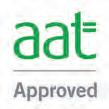
To celebrate the start of summer, we are offering 25% off AAT Accounting courses and 20% off AAT Bookkeeping courses until midnight on June 30th.
Premier Training students also gain free access to the hugely popular Xero Advisor Certification Course along with more than 30 other online short courses to enhance their CVs.
Interest-free instalment plans are available for all courses.
Get Started Today
Start your studies the same day24 hour online access with instant access to tutor support.
Learning Resources


Award winning learning resources including printed books, eBooks & e-learning, videos and quizzes.

Assignments
Prompt marking turnaround –marked by a tutor (not a computer).
Xero Advisor Certification

Premier Training has teamed up with Xero and is pleased to offer the Xero Advisor Certification Equivalency Course FREE OF CHARGE to anyone who enrols.
info@premiertraining.co.uk 01469 515444
of the Year
Online College
Introducing Accountext
Steven Nash explains how Accountext can power AAT colleges with resources proven for distance learning students
I’ve sometimes referred to Accountext as the ‘biggest bookkeeping and accounting resource provider you’ve never heard of’. But although that sounds flippant, there’s some truth in that statement.
Although we are a new player in the study resource market, Accountext study materials have already been used by thousands of students who studied with distance learning provider Training Link. And with reported pass rates above 90% for students who have used that material, the obvious question was to wonder how it could perform when used in a classroom environment.
That’s a question we wanted to answer when we started working with Hull College. Suzanne Eleftheriou teaches AAT at Hull College and she is enthusiastic about her experience of using our Accountext+ system. She said: “I’ve used a lot of training material over the years and I’ve found that Accountext’s were the most comprehensive and it just made my job a lot easier. The number of resources the students have access to is
incredible.”
The Accountext+ system that Hull College and others are using combines printed study books and question banks, e-learning and videos, e-assessment with automarking, and powerful reporting.
The study books are the core part of the learning experience. They are written as lessons, not just reference material. They combine explanations with practical examples and exercises to engage students and reinforce key concepts.
The accompanying online platform provides e-books, online assessments, practice exams, and a wealth of supplementary materials, ensuring that students have ample opportunities to reinforce their learning. And it was vital to us that our online system rendered key concepts on screen as they should look in real life; so, a cash book looks like a cash book and a T-Account looks like a T-Account.
Accountext wants to arm college tutors with the tools and resources to improve how they work and how they manage their time. That means providing study resources that have been proven
to be effective and were among the first to be used by students as part of AAT’s Q2022 trial last year. And it means providing powerful reporting, which lets tutors quickly identify the students who need more help and in which areas. It lets you see every single attempt, every single click – what a student has got right and what they have got wrong.
But what we won’t do is tie a tutor into a regimented and restrictive way of teaching the subject. For example, you can teach the units in whichever order you see fit.
With Accountext+ the tutor has the systems and resources, but the tutor is in charge and that’s exactly as it should be! For more go to www. accountext.co.uk
• Steven Nash, Accountext
WIN A SET OF AAT TEXTBOOKS

PQ magazine asked and Accountext delivered! One lucky reader has the chance to win a set of AAT texbooks from the level of their choice.
To be entered for this free draw simply send us an email headed up ‘Accountext Competition’, along with your name and address to giveaways@pqmagazine.com (we need to know where to send them) and we will do the rest. Deadline for entries is Friday 21 July 2023.

28 PQ PQ Magazine July 2023 AAT study materials
Levelling the playing field
The AAT is removing barriers to membership, while continuing to offer support for students and maintaining professional standards
AAT has introduced an easier and quicker way for students to become professional members once they have passed the Level 4 exam.
Progression Pathways is a modern approach designed to help students progress to professional membership. Based on feedback, it recognises the needs of today’s accountants to make an impact in the workplace. It removes the barrier of having to show suitable work experience – instead, members must complete a prescriptive CPD programme in their first nine months of membership.
What is the new system?
In place of work experience, AAT has pioneered a new system where students who have completed Level 4 are immediately eligible for membership once they have completed their fit and proper checks and paid their AAT membership fee.
In the first nine months, they’ll be supported with a compulsory CPD programme, which covers key areas they need in the workplace from ethics and sustainability to collaboration and leadership.
The accounting qualification is taken as the absolute proof of technical competence. But the CPD modules support individuals further by developing supplementary skills and behaviours, based on a formula that has proven successful in apprenticeships.
What are the advantages?
This new approach removes barriers for many would-be members and is in keeping with AAT’s desire to create open access to accountancy careers. The previous system sometimes created a Catch-22 situation: work experience was hard to come by without membership, but membership was contingent on securing work experience. It
was a system that created obstacles rather than one that helped students progress. For those who come into professional membership without work experience yet, it provides the benefit of accessing a broader bookkeeping and accounting community for support and opportunity.
Another benefit is consistency – all new members will have the same grounding, so can feel confident they have the same skills.
Crucially, AAT believes this approach will give the public greater confidence in a consistent standard of competence, helping the standing of the profession. This contrasts with public experience of unregulated accountants, which our Accountable research has found leads to problems that require a properly trained accountant to put right in 20% of cases.
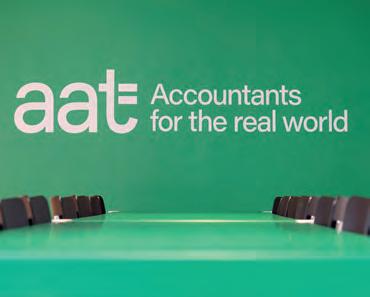
When does the CPD have to be completed?
The Pathway is simple: once you have demonstrated your technical competence by passing the final exam at Level 4, you are eligible to apply for professional membership. Completing the application includes 'fit and proper' checks and paying the membership fee.
You must complete the CPD pathway

within the first nine months to remain in membership. The programme is therefore delivered online and designed to flex around your career and time commitments. There’s no final test at the end of the modules, either.
What’s in the CPD programme?
To achieve that, the CPD programme has been put together with a rigorous commitment to maintaining standards. It’s designed around the framework of the Level 4 Apprenticeship and as such combines practical learning and case studies drawn from real life.
We believe this programme is better than most work experience that you would likely find at a similar stage. It's been put together to give a broad exposure to the kinds of challenges you’ll face as your accounting career progresses. So, whether that’s understanding your ethical responsibilities, how accounting supports business development or how to build effective teams, the programme aims to cover the most useful ground. We believe it will round out your technical skills and help you hit the ground running. Here’s the full list of modules:
• Module 1 – Awareness and adaptability to the business environment.
• Module 2 – Ethics, integrity and professional judgement.
• Module 3 – Adding value and delivering business success.
• Module 4 – Leadership, collaboration and working in teams.
• Module 5 – Planning, prioritisation and delivering accurate information.
• Module 6 – Sustainability.
• Module 7 – Data protection and information security.
• Module 8 – AML and fraud prevention.
Building your career
The modern accountant needs to understand a broader range of business drivers than previous generations. As a profession we’re expected to act as gatekeepers of business governance and efficiency, ethical leaders and gatherers of insight through data. That’s before we get to active and pragmatic agents of change around the sustainability agenda. This pathway will help you understand these issues with real life and relevant examples that reflect the challenges you’ll face as you build a career in accounting. Our goal is to give you the tools to help you fit seamlessly into the modern workplace. We believe this pathway will do exactly that.
• Thanks to the AAT for this article
PQ 29 PQ Magazine July 2023 AAT membership
mindful-education.co.uk/students Flexible learning to suit your lifestyle
Award-winning AAT courses and apprenticeships
London : Birmingham : Manchester : Online info@fctraining.org
0203 7908674







Bookkeeping & VAT Return Training Course
Train To Be
Sales/Purchase Ledger Clerk
Accounts Payable/Receivable
Bookkeeper
With Average Salary of 18K to 22K
Now Available Online
Management Accounting Training Course
Train To Be
Cost Accountant



Finance Controller
Finance Assistant
With Average Salary of 32K to 35K
Now Available Online
Bookkeeping and Payroll Training Course
Train To Be
Sales/Purchase Ledger Clerk
Payroll Administrator
VAT Manager
With Average Salary of 23K to 24K
Now Available Online
Final Accounts Training Course
Train To Be Finance Manager Assistant Accountant Accountant
With Average Salary of 38K to 45K
Now Available Online
Accounts Assistant Training Course

Train To Be
Finance Manager
Finance Assistant
Bookkeeper
With Average Salary of 26K to 28K
Now Available Online
Customised Accountancy Training Course
Train To Be Finance Controlling
Finance Management
Bookkeeper
With Average Salary of 18K to 38K+
Now Available Online
AAT Level 2 Foundation Certiicate in Accounting AAT Level 3 Advanced Diploma in Accounting AAT Level 4 Professional Diploma in Accounting Prepare Yourself For a GREAT Accounting Career Bridge The Experience gap between AAT Theory & Practice Now That’s an Education For your Successful Accounting Job! AAT Qualiications With Integrated Practical Accountancy Training
Learn Sage, Quickbooks, Xero, Payroll, Advanced Excel & More High Quality CPD Approved Training Award Winning - Practical Accounting Training under Supervision of Chartered Accountant Firm
The accounting equation explained
Karen Groves sets you a test – so how well do you know the dual effect principle?
The below shows that the equation will always balance, and assets must equal liabilities.
Profit will also increase the owner’s capital account and any drawings the owner takes, will reduce this. The equation can be shown as:
ASSETS – LIABILITIES = CAPITAL + PROFIT - DRAWINGS
So, what are Assets, Liabilities, Capital and Drawings?
Assets are owned and controlled by the business and can include:
• Office equipment.
• Motor vehicles.
• Inventory.
• Cash and Bank balance (if bank positive).
• Receivables (money owed by customers).
Liabilities are owed by the business and can include:

• Loans
• Payables (money owed to suppliers).
• Liabilities owed for VAT or tax.
• Bank balance (if overdrawn).
Capital can relate to money or assets invested by the business owner. These can include cash, vehicles, office equipment and so on. The amount is owed back to the business owner and therefore is a liability of the business.
Drawings are money or goods taken from the business by the owner for their own use.

Double entry bookkeeping starts from what is known as the accounting equation. For each business transaction, there will be two financial effects, known as the dual effect principle.
For accounting purposes, the business owner is separate from the business itself, which is known as the separate entity principle. If the owner invests money into the business, this is shown as capital introduced and then becomes a liability for the business, as the business then owes the owner the money.

The accounting equation shows how the money invested by the owner/s will equal the assets of the business. For example, the business owner may borrow some money to set up a new business, which is referred to as a liability, and can be shown as:
ASSETS = LIABILITIES + CAPITAL
The equation can also be re-arranged as follows:
ASSETS – LIABILITIES = CAPITAL
Example

The owner of the business has invested £6,000 of their own money and paid this into the business bank account. The equation would show:
ASSETS (BANK) £6,000 = CAPITAL £6,000
If the owner then borrowed £2,000 for a business loan, which was paid into the bank, the equation would show:
ASSETS (BANK) £8,000 – LIABILITY (LOAN) £2,000 = CAPITAL £6,000

Test your knowledge! Identify if the following items are assets or liabilities:
• Karen Groves is an AAT tutor and Faculty Director of Accounting at e-Careers
PQ 31 PQ Magazine July 2023 back to basics
ASSETLIABILITY Factory premises Shop equipment Bank balance (overdrawn) Business Loan Cash Delivery vehicle Answer ASSETLIABILITY Factory premises X Shop equipment X Bank balance (overdrawn) X Business Loan X Cash X Delivery vehicle X
www.e-careers.com (accounting) +44 (0) 20 3198 7600 Mon - Fri | 9am - 6pm Why study with us?
Selected courses include Online Training, Books, Live Online Classes and Tutor Support
We have trained over 10,000 AAT students
0% finance payment plans available ADVANCE YOUR CAREER IN ACCOUNTING PRICE MATCH GUARANTEE We will match like-for-like price.
✓
✓
✓
AAT Level 2 and 3 students – let’s quiz!
Teresa Clarke tests your knowledge with a fun quiz

Anagrams
Instructions: Unscramble the letters to find a word or words relating to financial statements for partnerships or sole traders.
Example: cinmoe = income
• enurtcr nactouc
• wollgido
• litybaili
• canialnif
• ratpern
• tessa
• pexnese
• ruacclas
• cieths
• rital alecnba
• popatoinprrai
• nesbisus
Homophones
Instructions: Complete the following sentences by choosing the correct word.
• A business must file their / they’re / there VAT return for the quarter ended 31 January 2023 bye / by / buy 7 March 2023.
• The standard rate of VAT in the UK is currently / currantly 20%.
• A business is required too / two / to register for VAT when they exceed the VAT threshold.
• VAT that is due / dew / do to HMRC must be paid on time to avoid penalties.
• Accountants must comply with the fundamental ethical principles / principals
• A business with a turnover less than the VAT threshold can decide weather / whether to voluntary register.
• An accountant can provide advice / advise to
a client on how best to keep their VAT records.
Word wheel
Instructions: Create as many words as possible with the letters in the word wheel. You can only use each letter once and every word must contain at least three letters and include the letter in the centre of the wheel.
10 words – beginner 20 words – professional 30+ words – expert
There is one word with 7 letters to be found. Clue: a computer program designed to cause damage or disruption to a system.





































can find links to them all here – https://www. teresaclarke.co.uk/
ANSWERS
Anagrams
• enurtcr nactouc current account


• wollgido goodwill
• litybaili liability
• canialnif financial









• ratpern partner
• tessa asset
• pexnese expense
• ruacclas accruals
• cieths ethics
• rital alecnba trial balance


• popatoinprrai appropriation
• nesbisus business










Homophones
• A business must file their / they’re / there VAT return for the quarter ended 31 January 2023 bye / by / buy 7 March 2023.
• The standard rate of VAT in the UK is currently / currantly 20%.






• A business is required too / two / to register for VAT when they exceed the VAT threshold.
• VAT that is due / dew / do to HMRC must be paid on time to avoid penalties.
• Accountants must comply with the fundamental ethical principles / principals
• A business with a turnover less than the VAT threshold can decide weather / whether to voluntary register.










• An accountant can provide advice / advise to a client on how best to keep their VAT records.

Word wheel
Are, aal, lam, ram, mar, arm, ear, raw, war, law, ale, awe
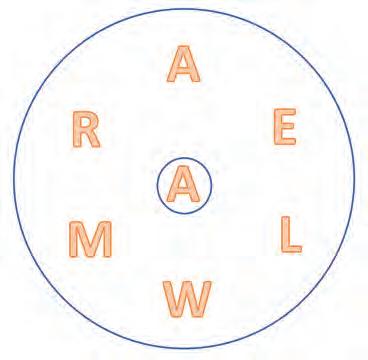
If you have enjoyed this little quiz you might like my workbooks, which include a ‘Just for fun accounting activity book’ and a ‘Preparing financial statements quiz book’, as well as many workbooks on different Level 2 and 3 topics. You
Lame, mare, real, ware, earl, marl, ream, warm, male, wale, meal, wear Alarm, realm, waler, marle, aware, lawer Plus more…..








































































Seven-letter word - MALWARE: A computer program designed to cause damage or disruption to a system.
• Teresa Clarke, FMAAT
32 PQ AAT spotlight
Find out more at cimaglobal.com/CGMAFLP. Progress your career the flexible way. CGMA® Finance Leadership Program

Your June exams feedback
So, how were the summer ‘23 exams for ACCA students? Here is what sitters told us…

AA
Students admitted they struggled to get their wording right for the answers.
However, there were some who found the June AA exam ‘a breeze’ compared to the mock! The general feeling seems to be that the written questions were fairly nice, and MCQ harder than the mocks.
But, one student had just one word for the sitting ‘brutal’.
TX
Some PQs felt this exam was very different to past papers. And, they found the VAT and CGT questions hard.
One sitter admitted “I messed up everything.” Another said; “I have never worked so hard at an exam and been so brutally underprepared. I hated the paper.”
Students seem convinced there was an easy bank of questions and a hard one. So, it was either the nice paper with the question about Nieves or the horrid one with furnished lettings.
The Open Tuition Instant Poll had this one as a ‘disaster’ for 15% of those taking the test this June, and ‘hard’ for another 38%.
PM
One sitter called it ‘just evil’ because of the question on currency rate changes between different countries for a travel agent. The gears and brakes question also confused many. In the Open Tuition Instant Poll 41% of sitters said the exam was ‘hard’, and another 22% said it was a ‘disaster’.
FR
As one sitter said: “It was not tough but I don’t know if I did well!” Another first-timer thought section C was especially hard. Many sitters admitted they just didn’t understand a lot of the questions in section A&B.
Over 50% of students in the Open Tuition Instant Poll felt the exam was either ‘hard’ or a ‘disaster’. That said some 9% of respondents said it was ‘easy’, which is quite high for these polls!
There was one scary comment on one of our favourite Facebook Groups: “I’II show my arse at the town hall if I passed mine.” Stay away from town halls everywhere on 17 July if you want to avoid that!
FM
“OK, with nothing out of the ordinary asked,” was one comment. A fellow sitter agreed but was worried that just gives you a false sense of security!
Others were shocked by the sensitivity analysis 16-marker – “What the hell?” asked one student.
It was still felt a hard test by 42% of those who voted on the Open Tuition Instant Poll.
SBL
Not bad, is how one sitter described June’s SBL exam. They liked the fact that 4 exhibits were linked to 4 separate questions: “So I didn’t have
to read them at the beginning”.
A fellow PQ agreed that the topics were ‘OK’. This is backed up by the Open Tuition Instant Poll where out of the 500 respondents (when we looked), 58% said the exam was ‘OK’ and 6% said it was ‘easy’.
Yet another PQ said the written questions were ‘fairly nice’! But the MCQs were harder than the mocks. Many agreed that the MCQs were harder than usual.
We did hear of several students who suffered from technical issues – they ran out of space and were told they could not type any more! The invigilator had never seen anything like it in the seven years they had been doing it. Worryingly, one student admitted they didn’t tell the invigilator about the issue when it happened.
See what top tutor Sean Purcell said about the June SBL exam: https://www. facebook.com/seanpurcell.sbllecturer/ videos/241495445269387
SBR
The Open Tuition Instant Poll had just 22% saying this exam was ‘OK’. Some 41% of sitters felt the June test was ‘hard’, and for another 34% it was a ‘disaster’.
“Yikes! This was a mean one,” explained one PQ. In fact, they had no idea what they wrote for half of the questions. They suggested it was like
the joke about the man who thought he had lost all hope, then loses the last additional bit of hope he didn’t even know he still had!
Another sitter just wrote ‘absolute disaster’. That is not one of the options on the Open Tuition poll!
Others just felt the exam was very long and tricky. Keeping to the timings would have been key to passing this one.
A student even admitted that they called their mum after the exam and started crying. Although they said they can be quite dramatic. They were not alone, another PQ said: “It was horrific, first time I’ve come out of an exam and cried. I have passed all my others first time but setting myself up to resit this one.” They were gutted because of the long hours of revision they had put in. They explained: “The knowledge was there, but that exam was just cruel.”
Yet another sitter revealed: “What on earth was that! That was a horrific exam, I nearly cried half way through and had to take a three-minute break as my mind froze and I went blank.”
Here’s what one student said when ACCA asked for feedback: “There is not enough time to think what is being asked. There is no time to read scenarios twice. There is no time to look over our answers at the end. You are not testing us on how we handle stressful, time constrained situations. You are testing us on our knowledge
34 PQ PQ Magazine July 2023 ACCA June exams
and how we would handle the situations given. I knew how to handle most of those. If given the time I could have wrote double the amount I did. But because I am forced to move on I feel like I will fail on the lack of answer given. There needs to be either more time, less questions or the scenarios given in advance so we can be ready for the questions given on the day. The majority of comments I have seen on social media after the exam say the same thing, its not fair to put the time pressure on us and expect decent answers.”
Check out Tom Clendon’s SBR review at: Post | Feed | LinkedIn
AAA
Over one in three sitters found June’s exam ‘hard’, according to the Open Tuition Instant Poll, with a further 17% describing it as a ‘disaster’.
One sitter said: “That was the most difficult paper I’ve sat in my entire life. After all the hard work everything feels useless. Didn’t even finish the paper. The time wasn’t enough at all.”
A fellow student agreed: “One of the hardest ones I have done.”
However, some sitting the UK variant seemed to think this June’s exam wasn’t too horrible. As one PQ put it: “I came out to the exam feeling positive, so am hoping for a pass.”
Time was still the enemy for many. “I ran out of time and needed another 15 mins.” There were others who admitted they spent too much time on Q1, always a fatal mistake.
ATX
June’s exam was described as ‘Okay’ and ‘relatively easy’ by many. Students liked the fact there are three big questions, rather than four. Some felt it made it easier timewise.
In the Open Tuition Instant Poll some 21% said they had a bit of a ‘disaster’ with this one, and another 36% admitted they found it ‘hard’.
APM
Just under a third of sitters (31%) thought the exam was ‘OK’, according to the Open Tuition Instant Poll. But, for 28% of respondents the exam was a ‘disaster’.
Quite a few students reported technical issues on this one. Sitters thought this was a super hard exam, with some saying they should have had more guidance in the scenarios.
Time was a problem for some too, with many sitters admitting they missing one of the 12-mark questions.
AFM
‘Outrageous’ is how one sitter describe this June’s AFM paper. Adding: “Just not sure how they expect us to do that with no notes in that space of time. Fuming!” Another sitter said: “Never been more certain of a retake in my life.”
Others described is as a ‘disaster’ and ‘a bit tricky’.
After all the comment though, the Open Tuition Instant Poll said it was ‘OK’ for 53% of sitters.
Where’s the mop?

The ACCA exams are over. So, what is the first thing you plan to do? A stiff drink isn’t on the menu for most people - for many ACCA’s it is…cleaning the house, apparently!
As One PQ said: “Does anyone else get home from an exam and see their house clearly for the first time in weeks! I think I’ll be spending my first study free weekend cleaning, my eyebrows could do with a good going over too.”
Another admitted:” Yes! House is a tip, kids are probably filthy, no one has had a ‘proper’ meal in a while. Will definitely be super cleaning this weekend too.”
They weren’t alone, yet another PQ said: “Lol I had a manic clean as someone new was over yesterday. I’m so excited to try and find my floor again this weekend.”
PQ 35 PQ Magazine July 2023 ACCA June exams
Sorted, thanks to pqjobs.co.uk PQ jobs pqjobs.co.uk
Accountancy can open the doors to academia
Richard Willis explains how a job in accounting helped him to become a university professor

The National Health Service celebrates its 75th anniversary in July. The NHS, now falling apart at the seams and weighed down by long waiting lists, was my first employer.
The job was at a flagship hospital, Guy’s in London, and I worked in the management accounts department. The experience there set me up to gain skills and knowledge to keep the wolf from the door and more, and ultimately to land the job of my dreams.
Stimulated by statistical data and armed with a calculator, I immersed myself in doing full-time work to the best of my ability. I learnt a craft, which opened the door for entry to the accountancy profession. But it was not as a fully qualified accountant, partner, director or CEO that defined my career.
It was around this time that I subscribed to a history magazine, available online and in most high street newsagents. The purchase was not so much derived from a burning ambition to learn about a new subject, but rather to rekindle a distant spark of interest in history when I was at school.

As I read more about the lives of our ancestors, ranging from the conspiracies of government, famous battles in countries such as Vietnam to colonial wars in Africa, my focus increasingly became placed on a desire to dig deeper.
I soon found myself enrolled on two evening courses, in A-level accounting and history, and while still doing the day job at Guy’s, I applied to read history and economics at Brunel University.
I passed and got good grades for the two A-levels and this led to a place at university. The course was known as a ‘thin sandwich’ one, not meaning a tasty cheese and ham snack, but rather blocks of academic study interspersed by paid work.
My knowledge of accounting secured for me a student attachment for what was then known as the College of Preceptors, the word preceptor meaning ‘teacher’ in Victorian Britain. The college, then located in Epping, Essex, ideally wanted someone with financial and costing experience to support the introduction of a new
range of distance learning courses for in-service teachers at home and overseas.
As part of my first work placement, I soon found myself doing accounting tasks such as projecting the use of funds, calculating financial ratios, and costing. The treasurer at the college, Sir Robert Balchin, educationalist and pioneer for school autonomy, complimented me on my work. Robert was very impressed by the accurate costings I provided.
On one cold wintry afternoon towards the end of the first placement, the college’s academic administrator opened up the building’s loft and showed me a mass of unclassified records dating back to the 19th century. The sight of the paperwork and volumes of data immediately enthused me with ambitious thoughts concerning the preceptors’ history. My heartfelt desire to delve into the educational past of this archaic institution grew exponentially.
Here before me was arguably a missing chapter from England’s educational heritage. As the days rolled by, my thirst to give some kind of shape and historical perspective to this unique archive was unquenchable.
I did my best to research primary and secondary sources into the College of Preceptors’ history. I stumbled across a book titled The
Evolution of a Profession written by Peter Gosden, professor of education at Leeds University. Inside this publication was a meaty chapter on the preceptors’ past. I enthusiastically gathered more information. Meetings at 10 Downing Street in 1847 between the then prime minister, Lord John Russell, and preceptors’ officials were aimed at securing financial aid for their newly launched enterprise.
I funded my postgraduate studies by carrying out temporary accounting jobs. Later, I was awarded a PhD in the history of education. I had no student debt.
I then worked as a senior researcher at London, Roehampton, Adelaide, Oxford and Cambridge universities. This year, I was appointed visiting professor at the University of South Wales. I landed the job of my dreams. All had been made possible for me as a direct result of the time I’d spent working and studying as an accounts assistant at Guy’s.
I am delighted to be working in the world of ivory towers and scholarly research. The whole process was made possible by the work I did at Guy’s, enabling me to find what I see as an ideal career and true vocation and in life.
• Richard Willis is a British historian and visiting professor at the University of South Wales
36 PQ PQ Magazine July 2023 profile
ONE WEBSITE TO RULE THEM ALL! Check out the funky website Go to pqmagazine.com – where nothing is fake, and all the news is real!
Dear Karen
Ask PQ’s very own agony aunt Karen Young when you need advice from a real expert. Email your dilemma to graham@ pqmagazine.com, and he will pass on the best ones to Karen
THE DILEMMA
I often hear employers talk about the importance of upskilling, but where can I start?
Where’s the cafeteria?
Food at work, sustainability and digital are all high on the wish list of Gen Z talent
met, reveals new research from Compass Group, the foods services company (see In brief, below).
Born between 1996 and 2010, Gen Z are expected to account for 27% of the global workforce by 2025. And 72% of Gen Z say an on-site cafeteria would encourage them to join a prospective employer.

Gen Z workers are the most vocal generation calling for enhanced wellbeing, sustainability and digital benefits in the workplace, and are willing to look at alternative employers if their needs aren’t
In brief
KAREN’S
RESPONSE
Improving your skills is a crucial part of career development, especially in the face of rapid advancements in technology and ever-changing roles and responsibilities. Here are three ways to help you on your upskilling journey:
1. Answer some key questions: Reflect on what goals you want to achieve through upskilling. Do you have any gaps in your knowledge? If you have a particular passion you want to pursue, which skills can you develop to facilitate this? Which skills might be most in-demand in the future? This is a great way to give you a sense of direction.
2. Access the relevant resources: Find out if your organisation has a learning portal with free resources to support upskilling, or you can research and source training courses externally. There are many opportunities out there; for example, you may require training to use cloud accounting software, so a specific programme would help to address this.
3. Continue your learning to futureproof your career: Remember that upskilling is a process to dedicate time to throughout your career. Soft skills will always be valuable, so if you’re unsure where to start in terms of what area to upskill in, focus on improving things like communication, problem-solving and adaptability. Continuous learning will allow you to move with the times, set you apart from competition and help you to thrive.
• Karen Young is a director at Hays. She is passionate about helping people to find the right job and companies the right person

Male bosses suffer ‘benevolent sexism’
Male bosses are blamed for poor business performance and risky behaviour while their female counterparts are perceived to be victims of bad luck.
A new academic study of gender stereotypes found that ‘benevolent sexism’ – where women are seen as “affectionate and delicate individuals who need to be protected” – was still widespread in the workplace. The researchers also discovered men were more likely to give women the benefit of the doubt than their own female colleagues. UEA’s Dr Boon Han Koh, co-author of the report, said that “in the case of failure, men are assigned more blame than women and perceived as being selfish”.
Using an app is also something that comes naturally to them, and 68% of Gen Z are happy to order food and drinks via an app, compared with just 23% for Baby
FRC hunt for new boss starts
The new boss of the FRC will be expected to work in both London and Birmingham, according to the new job advert.
They will need “credibility, integrity and capability” to help ensure “organisation change”. When it comes to salary, they will be paid a cool £330,000 plus benefits.
The FRC’s job advert said: “We continue our journey towards becoming a strong, impactful and fit-for-purpose regulator, which in turn provides increased confidence in the UK market.” However, a date for the FRC to become the ARGA has still to be confirmed.
In case you were thinking of
Boomers.
The research reveals that the pandemic and global cost of living crisis have made employees more mindful of what they want and deserve from an employer. Workers also say they are less loyal towards their employer since Covid-19 (38%); however, this jumps to half (51%) for Gen Z employees. Facing higher costs of living, 81% of Gen Z and Millennials advocate for employers to provide free or subsidised meals at work, too.
applying, applications closed on 5 June.
Compass Group switches to dollars
Compass Group, the world biggest contract caterer, saw half-year profits rise above £1 billion, as it benefitted from workers returning to the office and lots of sporting events.
However, with the bulk of its business now taking place in the US, it said moving forward it would be reporting its profits in dollars.
CEO Dominic Blakemore said the currency flip simply reflects “the economic reality of our geographic footprints… when we report sterling, we are exposed to over 75% currency volatility. If we report in dollars, we minimise that to 20%.”
The PQ Book Club: books you should read
Ruthlessly Caring: and other paradoxical mindsets leaders need to be future-fit, by Amy Walters Cohen (Wiley, £18.99)
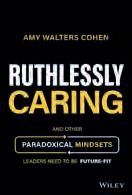
Is it me or are business book titles getting longer? Still, get past that and we get to Amy Walters Cohen’s ‘five paradoxical mindsets senior leaders must embrace to become more adaptable and aligned with the times’.
So, what are these five mindsets? They are: ruthlessly caring, ambitiously appreciative, politically virtuous, confidentially humble, and responsibly daring. Have you got any of these?
What is interesting is that Cohen says after chapters 1
and 2 you can read the book in any order. She says go straight to the mindset that looks most appealing to you.
In her first chapter she looks at the megatrends such as advancing technology, climate change, hyperconnectivity and inequality. But she warns that we must not put these in neat little boxes. In reality, these megatrends interact and overlap – like they are swirling around in a giant washing machine.
The second chapter looks at the elements that make up the five mindsets. One of first things Cohen asks you to do is look at each mindset element and roughly rate where you are. For example,
how ruthless are you – too low, just right or too high?
Remember, you will have to answer that question for ‘humble’!
One chapter Cohen doesn’t want you to skip is the last one, on developing and expanding your identity. She says that identity is not fixed but continually shaped.
PQ rating: 4/5 As Cohen said, if we can expand our identity we can learn to think differently. And, if we tell and retell the same stories about ourselves, we can become trapped in the same limited patterns of thought and behaviour.
PQ 37 PQ Magazine July 2023
PQ
careers
Pets v private jets
Luxury airline firm boss Patrick Hansen has claimed that pets cause as much pollution as private jets. The CEO of Luxavaiation, which is based in Luxembourg, told the Financial Times that one of his company’s customers produces about 2.1 tonnes of CO2 a year, roughly the same as three dogs.

Hansen used data from Mike Berners-Lee’s book ‘How Bad are Bananas?’, which estimates that a pet cat produces 310kg of carbon emissions per year and a dog about 700kg.
Hansen said: “Of course, if no one flew privately, these private jet CO2 emissions would not be emitted. And if no one had a pet, there would be no pet food production emitting CO2.
Horribly history: you can pay in eels!
The European eel is now on the critically endangered species list, but that has not always been the case. In Medieval England eels were extensively used to pay rent. Historian John Wyatt Greenlee says the first recorded payment made with eels was in the year 700. By 1086 and the Domesday Book more than half-a-million eels were used to pay the rent every year. Greenlee explains: “There are more rents paid in eels than anything else in the Domesday survey.”

It should also be remembered there were 120 ‘meat free’ days a year due to religious observance, so fish was in much higher demand at those times. It was only in the 17th century that eel rental payments ended.
AI more empathetic than real doctors
An AI ‘chatbot’ was found to be “significantly more empathic” than doctors when responding to a patient’s questions, according to new research.
Fancy a round?
The Chartered Accountants Golfing Society (CAGS) is looking for new members ‘to increase diversity and enjoy the networking and mental health benefits of the sport’.
At 125 years old, CAGS is one of the oldest golf societies, and recently celebrated its birthday in style with a match and lunch at The Berkshire Golf Club. ICAEW President Julia Penny was one of the players present.

Founded in 1898, the society has 400 members, but wants to attract newcomers, particularly women and those from an ethnic minority so it can reflect the diversity of the profession.
With membership at £30 per year, or £300 for life, joining CAGS is an affordable way to access these benefits, as well as the chance to play on some of the highest-regarded golf courses in England and beyond. Membership is open to all ICAEW members who have an official golf handicap.
The scientists said that while more research is needed, doctors may need to start to use AI to help draft responses, which they could then edit. Researchers explained: “Randomised trials could assess further if using AI assistants might improve responses, lower clinical burnout and improve patient outcomes.”
A leading tutor told PQ magazine that accountants should look at this story and imagine how this technology might affect them: “If you went into accountancy because you felt you were better with numbers than people then your days could be numbered.” He said that AI will be able to do the sums quicker, so accountants will need a better bedside matter – but if the AI is doing that better than doctors, what’s next?
What can you claim on expenses
Labour’s deputy leader Angela Rayner recently hit the headlines after it was discovered she put her £139 earphones on expenses. Apparently, she has previously charged us £249 for AirPods, and these were a pair of secondgeneration AirPods.

Everything was passed by the parliamentary watchdog, but then the Sun newspaper found out. It was then that Rayner decided to pay for them herself.
In the past Rayner rightly pointed out that all her equipment must sync so she can carry out her work. She explained: “I wouldn’t say that it’s luxury to have computer equipment that is everyday expenditure for somebody that works with computers every day for their job."
More MPs have hit the news after they claimed fines on expenses. Among them was a minister in the energy department, Amanda Solloway, who claimed back an £80 fixed penalty notice under ‘MP travel expenses’.
So, what is a justifiable working expense? We have asked the Sun!
WE V E G O T T H E L O T ’
Sock it to them

PQ magazine recently partnered up with Accountex London 2023, which saw record attendance this year. What was noticeable, however, was that there was not as much free stuff knocking around on the stands. Apparently, everbody wants to save the world, rather giving away more plastic toot! We did catch up with our friends at the ICB, and they were giving away something we all need – socks. But these are not any old socks, these are ICB socks, made from 80% bamboo and very spotty! We have three pairs to give away and will throw in a PQ pen and PQ bottle opener to the lucky winner of this prize. To be in with a chance of being sent the ICB socks simply email us at giveaways@pqmagazine.com with your name and address and we will put you in the hat for a chance to win this prize. Head up your email ‘ICB sock it to me’.
PQ book club heaven
We have more books to give away this month –four, in fact – which all got great reviews from the PQ magazine Book Club. Up for grabs are Steve Gates’ The Negotiation Book: Your Definite Guide to Successful Negotiating, and Stop Talking Start Doing: A Kick in the Pants in Six Parts by Shaa Wasmund and Richard Newton. Also on offer are Speak with Confidence by Mike Acker and Make Work Healthy by John Ryan and Michael Burchell.
To win one of these books in our PQ Book Club lucky dip just send an email headed ‘July Book Club’ to giveaways@pqmagazine.com, along with your name and address.
Terms and conditions: One entry per giveaway please. You must send your name and address to be entered for the draw. All giveaway entries must be received by Friday 21 July 2023. The main draw will take place on Monday 24 July 2023.

38 PQ the PQ Magazine July 2023 got a story, funny or serious, you want to share? Email graham@pqmagazine.com
TO ENTER THESE GIVEAWAYS EMAIL GIVEAWAYS@PQMAGAZINE.COM




















 Graham Hambly, Editor and Publisher, PQ magazine
Graham Hambly, Editor and Publisher, PQ magazine





































































































































































































